History as Dangote Refinery Exports Two Cargoes of Jet Fuel to Saudi
suit March 18 Oando offers shareholders

PDP Crisis: Party's BoT Urges NWC to Swear in Ude-Okoye as National Secretary

suit March 18 Oando offers shareholders

PDP Crisis: Party's BoT Urges NWC to Swear in Ude-Okoye as National Secretary
Justifies why Mineral Resources Ministry was allocated extra N1trn Shares additional revenues to Banks of Agric, Industry, military, others Bagudu explains increment NASS promises to pass Appropriation Bill this month Opposition lawmaker kicks








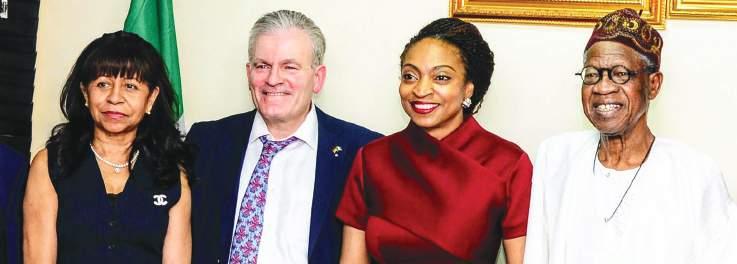
Deji Elumoye in Abuja
Vice President Kashim Shettima has declared that Nigeria must continue to use public debt as a vehicle for the development of critical infrastructure and tool for economic growth and
poverty reduction. He spoke yesterday, in Abuja, while inaugurating the Supervisory Board of the Debt Management Office (DMO) as part of efforts by the federal government to strengthen fiscal and monetary policy coordination and
PETROAN Backs Ban on Exportation of Crude Oil Allocated to Local Refineries
The Petroleum Products Retail Outlets
Owners Association of Nigeria (PETROAN) has commended the federal government for banning the exportation of crude oil allocated to local refineries.
President of PETROAN, Dr. Billy Grillis-Harry gave the association's backing to the government policy in a statement issued yesterday, by National Public Relations Officer of PETROAN, Dr. Joseph Obele.
Gillis-Harry said the ban was expected to boost local refining capacity, reduce the importation of refined petroleum products, and ease pressure on foreign exchange supply.
According to the PETROAN boss, exportation of crude oil meant for domestic refining had led to the abandonment of local refineries.
He alleged that there had been a major racketeering scheme in the Domestic Crude Supply Obligation (DCSO) policy, with producers and
traders prioritising quick foreign exchange proceeds over local refining.
According to PETROAN, "approximately, 500,000 barrels of crude oil per day are allocated for domestic refining, but these volumes often find their way to the international market."
Grillis-Harry also said the ban was expected to have positive impact on the economy, saying refining crude oil locally would enrich the petrochemical industries and agricultural sector, reduce inequalities in income, and enable Nigeria to transition from a raw material supplier to a value-added product supplier.
He, however, urged the Nigerian Upstream Petroleum Regulatory Commission (NUPRC) to take swift action against refineries, cargo vessels, and companies that default on this policy.
He expressed belief that the policy would guarantee sufficient refined petroleum products in the country, leading to price reductions and better days ahead for Nigerian consumers.
ensure long-term debt sustainability in line with President Bola Tinubu’s Renewed Hope Agenda.
In his speech at the maiden meeting of the Board at the State House, the Vice President who doubles as Chairman of the Board charged members to come up with a more strategic approach to public debt management.
According to him: “With prudent management, debt can be transformed into an asset for economic growth and poverty reduction. Our goal must be to formulate policies, regulations, and guidelines for the DMO, with
a view to achieving long-term debt sustainability for our country."
The Vice President stressed that borrowing, when applied prudently, could serve as a catalyst for economic growth rather than a financial liability.
"As you all know, public debt, if prudently applied, becomes an asset for economic growth and poverty reduction. However, recent realities in our economy call for stronger coordination between our fiscal and monetary policies,” he said.
Shettima commended Tinubu for his economic reforms, acknowledging the President’s dogged efforts towards
reforming the Nigerian economy.
He also praised the Minister of Finance and Coordinating Minister of the Economy, Wale Edun and the DMO leadership for their untiring efforts in the day-to-day management of the nation’s sovereign debt portfolio.
He added: "I also use this opportunity to congratulate them and other members of the Nigerian delegation for a successful outing in the recent $2.2 billion double-tranche Eurobond issuance. The over-subscription rate of the bonds showed an impressive appetite for our country’s sovereign
instruments in the global capital market."
Other members of the
are Edun (Vice
Attorney General of the Federation and Minister of Justice, Lateef
Madein (member), and Director-General of the Debt Management Office, Patience Oniha (Secretary).
The West African Gas Pipeline Company Limited (WAPCo), owner and operator of the West African Gas Pipeline (WAGP) has begun major pipeline maintenance activities involving the pigging and in-line inspection of the 569 km Nigeria, Ghana, Benin, and Togo Gas pipeline.
The company said the maintenance on the gas pipeline was scheduled from February 5 to March 2, 2025, starting from Ajido, Lagos State, Nigeria to Takoradi, Western Region, Ghana and replacement of critical subsea valves at Tema and Cotonou to enhance operational
safety.
In a statement issued yesterday, the company said the maintenance project would necessitate the temporary suspension of specific services, including the reverse flow transportation of natural gas from Ghana’s Western Region to Tema in the east, as well as gas transportation services from Nigeria to Cotonou (Benin), Lomé (Togo), and Tema (Ghana).
However, it said some gas transportation services from Nigeria to Takoradi in Ghana would continue during the period to ensure the successful execution of the pipeline cleaning and inspection activities.
The gas pipeline operator
Adedayo Akinwale and Juliet Akoje in Abuja
The House of Representatives has directed the Nigerian Communications Commission (NCC) to investigate the unsolicited and illegal linking of National Identification Number (NIN) by telecom service providers to phone lines not belonging to them.
Also yesterday, the House declared submerged oil-producing Ayetoro, Awoye, Molutehin, Abereke in Ilaje/ Ese Odo Federal Constituency of Ondo as disaster zones.
Furthermore, the Green Chamber urged the NCC to investigate the allegations and take immediate action against any telecom service provider found to be culpable in such practice.
The resolution of the House followed the adoption of a motion moved at the plenary yesterday, by Hon. Patrick Umoh and Prof. Julius Ihonvbere
Moving the motion, Umoh expressed concern about recent reports of telecom service providers in Nigeria linking NIN to subscribers’ lines without their consent, thereby
explained that the comprehensive cleaning and inspection exercise was a key regulatory requirement and aligns with industry best practices to ensure the safe and efficient operation of the West African Gas Pipeline (WAGP).
It noted that the cleaning and inspection, which encompasses the entire pipeline stretch from Itoki, Ogun State, Nigeria to Takoradi, Western Region Ghana was in two phases.
The company said the first phase, which was completed in December 2024, involved cleaning and inspecting the onshore section of the pipeline within Nigeria.
WAPCo added that the second
phase which was scheduled to start on February 5, 2025, would focus on the offshore section of the WAGP.
WAPCo noted that it was mandated to conduct these inspections every five years (or on a risk-based schedule) as part of its commitment to maintaining the integrity of the WAGP and ensuring its safe and reliable operation across the West African region.
It said it has actively engaged with key stakeholders to ensure the necessary alignment for the successful implementation of the project, expressing its gratitude to the governments of Benin, Ghana, Nigeria, and Togo for their ongoing support.
exposing them to criminal activities and subjecting legitimate NIN holders to grave risk.
He argued that the action was a clear violation of the Nigeria Data Protection Act, 2023 and the Nigeria Data Protection Regulation (NDPR) 2019, which guarantee the right to privacy and protection of personal data of every Nigerian;
The lawmaker recalled that that the NIN was established to streamline the verification and identification of persons and enhance security in Nigeria.
“Also aware that the potential risks and consequences of this unauthorised data linking include identity theft, financial fraud, and other forms of cybercrime that have become rife in Nigeria lately,” Umoh added.
He said innocent citizens have been wrongly implicated in crimes, suffer reputational damage, harassment, and legal challenges for crimes they know nothing about;
The House resolved to, “Urge the NCC to investigate these reports and take immediate actions against any telecom service provider found to be culpable in this practice;
“Urge the National Identity Management Commission to confirm whether the linking of NIN numbers by telecom service providers was authorised and in compliance with relevant laws and regulations.”
The House also mandated its Committees on Communications and Interior to conduct a thorough investigation into this matter and report back to the House for further
legislative business within four weeks. Meanwhile, the House of Representatives yesterday, also declared submerged oil- producing Ayetoro, Awoye, Molutehin, Abereke in Ilaje/ Ese Odo Federal Constituency of Ondo as disaster zones.
The resolution followed the adoption of a motion on the urgent need to declare sea-wedged and submerged oil producing communities as disaster zones moved by Hon. Donald Kimikanboh Ojogo at plenary on Wednesday.
The lawmaker noted that "these communities account for 5.8 percent of the 60,000 barrels per day (BPD) of Ondo State's crude oil production output amounting to about 3.7 percent of Nigeria’s total oil production.
“This ranks Ondo State among Nigeria’s oil-producing states as captured by the NDDC law."
He said, "devastating sea incursions and ocean surges have been the albatross of these communities for over two decades with hundreds of homes and properties destroyed resulting in the displacement of indigenes of the communities in their thousands and culminating in disruption of oil exploration activities, thereby posing threats to peace and security in the riverine areas of the State.
"The surges which have become an annual occurrence all along have reached a peak thereby submerging more than half of each of these communities; and in the case of Awoye in particular, the community is now split into by the ravaging incursion."
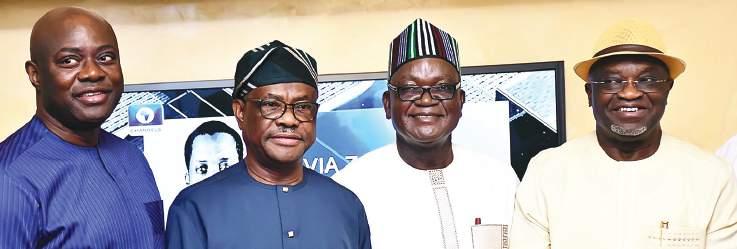
Emmanuel Addeh in Abuja
Nigerian media mogul and creative industry pioneer, Mo Abudu, has officially announced the launch of ‘Naija Creates’, a groundbreaking showcase and celebration of Nigeria’s creative excellence, set to debut in London this summer with Lagos Canvas as the headline sponsor.
Organisers of the programme stated yesterday that Naija Creates is not just an event, but a movement—a platform that highlights Nigeria’s finest talents across fashion, music, art, film, and food while placing monetisation at the centre of the conversation.
With the creative industry projected
to contribute significantly to Nigeria’s Gross Domestic Product (GDP) in the coming years, Abudu emphasised the urgency of global expansion and structured commercial opportunities for Nigerian talent.
Abudu recently met with Vice President Kashim Shettima at the Presidential Villa to seek his endorsement and support for the initiative, where Shettima assured of his unwavering backing, underscoring the government’s commitment to fostering Nigeria’s creative and cultural industries.
The meeting was also attended by key stakeholders, including Fegho Umunubo, Special Assistant to the
President on Digital & Creative Economy; Stanley Nkwocha, Senior Special Assistant to the President (OVP) on Communications & Media; Tope Fasua, Special Adviser to the President (OVP) on Economic Matters; and Esther Nkemdirim, Head of Human Resources & Operations, EbonyLife Group.
“Naija Creates is the next step in a larger journey that Abudu has been building over the years, following the success of initiatives like ‘Africa Creates’ at the IMF World Bank Meetings in 2023 and Lagos Canvas in 2024 and 2025.
“These platforms have successfully brought together creatives, investors,
and policymakers to drive global opportunities for African talent. The Nigerian creative economy is one of the fastest-growing sectors in Africa, with projections estimating that it could contribute over $15 billion to the country’s GDP by 2025 if given the right structural and financial support,” the statement added. It observed that Nollywood alone generates an estimated $600 million annually, and Nigeria’s music industry, led by Afrobeats, has seen a 63 per cent revenue increase year-on-year, with artists selling out global arenas. Fashion, visual arts, and culinary experiences are also experiencing unprecedented demand internationally.
In her remarks, Mo Abudu stated : “Naija Creates is the next evolution of a journey I have been on for years, a journey to position Nigeria’s creative industries as global economic powerhouses.
“ We are rich in talent, innovation, and culture, but we must go beyond celebration and into commercial success. Nigeria’s creative economy is a sleeping giant, and when structured correctly, it has the potential to rival oil and gas in economic impact.
“With Lagos Canvas leading the way and Naija Creates taking this mission global, we are making it clear, Nigeria’s brands and talents belong on the world stage, and we are here
Ganduje welcomes new member Senate asks FG to rename Kado Estate after Useni, approves three new members for CCB
Adedayo Akinwale and Sunday Aborisade in Abuja
Chairman of the Senate Committee on Reparation and Repatriation, Senator Ned Nwoko has formally defected from the Peoples Democratic Party (PDP) to the All Progressives Congress (APC).
His defection letter was read on the floor of the senate by President of the Senate, Senator Godswill Akpabio,
during plenary.
The letter was titled: “Notice of Departure from the Peoples Democratic Party (PDP) to the All Progressives Congress (APC).”
Nwoko explained that his decision was based on the persistent crises plaguing the PDP, saying the development had weakened its ability to function as an effective opposition political party.
“The PDP, which once stood as a
Blessing Ibunge in Port Harcourt
The National Security Adviser (NSA), Mallam Nuhu Ribadu has expressed the need for a holistic approach in addressing security challenges in the oil and gas sector.
Ribadu who noted that Nigeria’s oil and gas sector faces a systemic problem; noted the need for more structured, systematic and resilience in addressing the energy security challenges.
The NSA said this while speaking in Port Harcourt, Rivers State, at a meeting organised by the Chief of Defence Staff, General Christopher Musa for stakeholders in oil and gas sector.
Ribadu, represented by his Special Adviser on Energy Security and Niger Delta Affairs, Osaretin Ihu Grace, echoed the sentiments of the CDS. He underscored the need for a methodical, resilient and strategic overhaul to address both operational
inefficiencies and entrenched security concerns.
The NSA’s insistence on a holistic approach, signaled a profound strategic reorientation that recognises the interdependence between energy security and national stability.
While expressing support for the President Bola Tinubu’s production target of 2.5million barrel per day, Ribadu highlighted systemic issues that had historically undermined the oil and gas sector.
He stated: “Years of mismanagement and underinvestment in key infrastructural assets have left the sector vulnerable.”
The NSA called for a structured and systematic response for comprehensive reforms in areas such as maintenance, technology adoption, and workforce training.
For Ribadu, the challenges were twofold: “achieving the production mandate and fortifying the security of the nation’s energy infrastructure.”
formidable platform for democratic participation and national development, has unfortunately been engulfed in persistent crises, ranging from internal divisions to a lack of clear leadership and direction,” Nwoko said.
He expressed concern that the party’s instability poses a threat to Nigeria’s democracy.
“If urgent steps were not taken to address this national emergency, Nigeria risks sliding into a dangerous one-party system, which history has shown to be detrimental to governance and national stability,” he said.
The Senator urged the Senate to establish an ad-hoc Committee to investigate the internal crisis within the PDP and recommend solutions
to safeguard Nigeria’s multi-party democracy.
He said, “This committee should examine the root causes of the party’s internal implosion, engage relevant stakeholders, and propose reforms that will ensure the survival of a viable opposition in Nigeria.
Nwoko, nevertheless, pledged pledged continued service to the people of Delta North and contributions to national progress.
Welcoming Nwoko, the National Chairman of APC, Dr. Abdulahi Ganduje, said the ruling party believed in national unity, national integration and progress of Nigerians.
Ganduje stated: “There's no doubt our great party is the most nationalistic
party, the party that has spread from all over the country.
“Our party believes in national integration. Our party believes in national unity. Our party believes in progress and providing prosperity to the people of Nigeria.”
The chairman added that President Bola Tinubu was a visionary leader, saying the reforms he introduced were necessary to develop the country.
“Immediately he came, he knew where to start, he knew what to do, and he introduced some reforms.
Even though they are painful, but they are unavoidable reforms. If you want Nigeria to progress, there is no doubt you have to undertake such reforms.
to make it happen.”
Naija Creates, the statement said, will feature a curated exhibition showcasing Nigeria’s finest creative talents in fashion, music, art, film, and food. It will include investor roundtables designed to drive monetisation strategies for creatives, exclusive performances and fashion shows. It will also include: Food tastings and film screenings, highlighting Nigeria’s global impact in entertainment, and networking and business matchmaking opportunities with global stakeholders, investors, and decision-makers.
With the success of Lagos Canvas and the growing momentum of Naija Creates, Abudu said the platform is set to build something truly transformational for Nigeria’s creative economy. Mo Abudu is the founder and CEO of EbonyLife Group, a leading force in Africa’s creative and entertainment industries. She is a globally recognised media entrepreneur, producer, and philanthropist, and has been instrumental in bringing Nigerian storytelling to international platforms. Her international groundbreaking partnerships have redefined African narratives on the world stage. She is the first African woman to be listed on The Hollywood Reporter's Most Powerful Women in Global Television and has received numerous accolades. Besides, she is on the Forbes List of the 100 most powerful women in the world, as well as Lifetime Achievement Awards for contributions to the creative economy. Through initiatives like EbonyLife Creative Academy, Lagos Canvas, and now Naija Creates, she continues to champion opportunities for Africa’s next generation of creatives, the statement observed.
The United Nations Office on Drugs and Crime (UNODC) has assured the National Drug Law Enforcement Agency (NDLEA) of further support and renewed partnership in its ongoing effort to rid Nigeria of substance abuse and illicit drug trafficking.
The assurance was given on Wednesday when the new Country Representative of UNODC in Nigeria, Mr. Cheikh Toure, led a team of his top officials on a courtesy visit to the Chairman/Chief Executive Officer of NDLEA, Brig. Gen. Buba Marwa (rtd), at the agency’s national headquarters in Abuja.
While acknowledging the leadership role NDLEA plays in drug law enforcement in Africa and particularly the West African sub-region, Toure said his visit was to re-engage with the agency on how to cascade the successes recorded at the national level to the states.
He said this is because the drug scourge is at the basis of most of the security challenges at the subnational level.
According to him: “It is very important for us to re-engage and re-energize the relationship between UNODC and NDLEA and I think that me coming here today is to tell you I want to re-engage and reinvigorate our relationship so that
it serves Nigeria as a whole and also the rest of this sub-region by following your lead.
“NDLEA has been our partner and even facilitated our implementations in Nigeria. So, I want a re-engagement of UNODC with NDLEA to see how together we can develop a greater plan to support the remaining implementation of the master plan and going forward, the new stages of engagement with Nigeria.
“And one thing that we want to look at is how NDLEA can provide increased capacity building to West African member countries so that together we fight this menace and share best practices.”
In his remarks, Marwa appreciated the global body for its support to the agency over the years while expressing confidence that the new Country Representative will take the existing relationship to a new height.
While listing some of the numerous achievements the agency has attained in the areas of drug supply reduction and drug demand reduction in the past four years with support of local and international partners including the UNODC, the NDLEA boss said the visit by the team provided the opportunity to present before them some of the areas they should consider in their support for the agency.

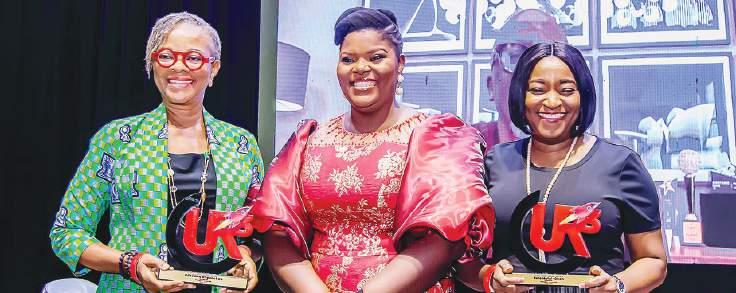
Abuja
The federal government has officially kicked off tolling on the the 227.2 kilometres Abuja-Keffi-Akwanga-LafiaMakurdi highway, an arrangement that is expected to help repay a loan obtained from the China Exim Bank.
However, vehicles driven by the police and military will be exempted from paying the fees, while commercial vehicles will pay only 50 per cent. Specifically, while cars will pay N500, Sport Utility Vehicles (SUVs) will shell out N800, light vehicles and minibuses will pay N1000, while trucks, buses and multi-axle vehicles will pay N1,600.
A brief on the project showed that toll gates on the routes are divided into four sections, namely: Keffi, Akwanga, Lafia and Makurdi.
The agreement falls under the Highway Development Management Initiative (HDMI) Phase 1 framework, which seeks to engage private sector participation in the management of key federal road corridors across the country.
The tolling was concessioned to Messrs China Harbour Operations and Maintenance Company Limited, in partnership with Catamaran Nigeria Limited, who will be responsible for tolling, maintenance, and overall operations throughout a 25-year period.
At the event which took place at Garaku Toll Station, Nasarawa State, the Minister of Works, David Umahi, represented by the Minister of State for Works, Bello Goronyo, said tolling operations remain pivotal to the maintaining of road networks
in Nigeria.
He described the road corridor as a vital infrastructure route in Nigeria, serving as an essential highway for both the economic and social activities of the central and northern regions of the country.
According to him, the collection of tolls will generate much-needed revenue for the maintenance and expansion of Nigerian roads, ensuring that Nigeria’s federal roads are properly maintained through sustainable funding mechanisms.
“It is with great pride and optimism that I stand before you today on behalf of the federal government of Nigeria as we officially launch the commencement of toll operations on our federal roads, beginning with the 227.2km AbujaAkwanga-Lafia-Makurdi road corridor.
“It is to be recalled that the Federal Government of Nigeria rehabilitated and upgraded the road through the preferential credit loan from the China Exim Bank. The loan agreement provided among other things, that upon completion, the road would be tolled, operated, and maintained by a private party and that revenue collected from the operation shall be preferentially used for the loan repayment to the China Exim Bank,” the minister stated.
According to him, the tolling initiative aligns with global best practices, ensuring sustained road quality while generating revenue for ongoing maintenance and loan repayment.
Besides tricycles, pedal vehicles, motorcycles, and other two-or threewheeled modes of transport primarily
used by disadvantaged populations are exempt from the toll fees, with general toll tariff projected to increase by 20 per cent every five years.
“I encourage all Nigerians to embrace this initiative as this will serve as a catalyst for improved road maintenance and economic growth. Therefore, I call on us all to continue to support this government
policy while ensuring that the ultimate goal of having a transportation system that is modern, safe, and capable of meeting the needs of our growing nation is achieved,” Umahi added.
Also speaking, the Nasarawa state, Abdullahi Sule, who was represented by his Deputy, Dr Emmanuel Akabe, sought the cooperation of Nigerians to make the tolling programme a success.
Deji Elumoye in Abuja
President Bola Tinubu has rejoiced with Governor AbdulRahman AbdulRazaq of Kwara State and Chairman of the Nigeria Governors' Forum (NGF) on his 65th birthday.
The President, in a statement issued on Wednesday by his Adviser on Information and Strategy, Bayo Onanuga, joined the governor's family, friends, political associates, and well-wishers in celebrating a lifetime of service, dedication to just causes, and visionary leadership.
On his part, Governor Babajide Sanwo-Olu of Lagos State also congratulated his Kwara State counterpart AbdulRazaq, as he celebrates his 65th birthday.
Sanwo-Olu, in a congratulatory message issued in Lagos on Wednesday by his Special Adviser on Media and Publicity, Mr. Gboyega Akosile, praised Governor AbdulRazaq for being a respected leader and good
manager of human and material resources.
President Tinubu acknowledged Governor AbdulRazaq's invaluable contributions, as the Chairman of NGF, to the success of his administration, particularly in mobilising governors to work with the federal government to address national challenges and implement policies that promote good governance and progress for all Nigerians.
The president believed the people of Kwara State are blessed to have a leader who is committed to improving the quality of life for citizens through investments in economic and human capital development, prioritising education, healthcare, agriculture, and social welfare initiatives.
President Tinubu prayed that the governor will continue to build on the remarkable achievements that have endeared him to the people and residents of the state.
He wished Governor AbdulRazaq
Says leaders always faced bottlenecks in implementing policies and programmes
Francis Sardauna in Katsina
Former President Muhammadu Buhari, yesterday, defended his administration, saying security and economy improved significantly during his eight years in office as president of Nigeria. Buhari stated this Wednesday when he received members of the Katsina State Correspondents’ chapel at his country home in Daura, Katsina State on a courtesy call.
He recalled that before his administration came on stream, security and economic challenges had pervaded the country, but his administration had curbed the menace of terrorism and economic meltdown.
He explained that the revolving security and economic strategies initiated and implemented by his government successfully tackled the economic and security woes he inherited
from his predecessors.
Buhari, who spoke in Hausa, said: “Security and economy improved significantly in Nigeria under my administration compared to what we met in 2015. Things will continue to improve in Nigeria.”
He said only Nigerians in the corridor of power would understand the administrative challenges confronting the country, adding leaders always faced bottlenecks in implementing policies and programmes.
Earlier, the Chairman of the Correspondents’ Chapel, Yusuf Ibrahim-Jargaba, commended the former president for tackling terrorism, banditry and other security challenges during his tenure.
Acknowledging the efforts of Buhari in keeping the country united despite decisive statements, Ibrahim-Jargaba said his hard work, dedication and selfless service made the country to remain indivisible.
Permanent Secretary in the ministry, Folorunsho Adebiyi, reiterated government's commitment to ensuring continuous funding of operations, maintenance and improvement works on the highways. He argued that a a well-maintained road will boost the national economy, enhance the fight against insurgency, reduce travel time and reduce the maintenance costs on vehicles and on the roads.
The Operation and Maintenance (O&M) concessionaire representative, Mr Jason Wong, promised to collaborate under the guidance of the Nigerian government to ensure that the road remains in excellent condition, providing high-quality travel experience for all users.
good health and strength to continue to fulfil his obligations to his people and the nation.
Meanwhile, Governor Babajide Sanwo-Olu said Governor AbdulRazaq has displayed pragmatic leadership with selflessness and dedication by rendering quality service and delivering the dividends of democracy to the people of Kwara State and Nigeria as a whole as the chairman of NGF.
His words: “On behalf of my adorable wife, Ibijoke, the government, and the people of Lagos State, I join family, friends, political associates, and the people of Kwara State to felicitate Governor Abdulrahman AbdulRazaq on his 65th birthday.
“Governor AbdulRazaq is a leader who has distinguished himself in
public office as a performing governor. His developmental strides in Kwara State and efforts at national growth are noticeable in different areas of endeavours. They are a testament to his visionary leadership and passion for good governance.
"His penchant for diligence and distinction is evident in his contributions to the development of Nigeria’s socio-economic and political landscape both as the Governor of Kwara State and the Chairman of the Nigeria Governors’ Forum (NGF).
“On this occasion of his 65th birthday, I wish our chairman, Governor Abdulrahman AbdulRazaq, good health and long life. I pray that God will give him more strength as he continues to render more service to humanity, Kwara State and Nigeria."
NESREA DG: Deployment of Telecommunication Installations Must Comply with Environmental Laws
The Director General of National Environmental Standards and Regulations Enforcement Agency (NESREA), Dr. Innocent Barikor, has said the agency will ensure the environment is given due consideration in the deployment of telecommunications infrastructure in the country and that such installations must comply with extant environmental regulations.
Barikor made the promise on Wednesday when he received two European companies, Consulting & Management and Europe Ltd, who were in his office to brief him on the European Union-funded project in Nigeria titled “EU Support to Federal Ministry of Communications, Innovation and Digital Economy
for studies in support of 90,000km Fibre Optic Network and Improved Digital Literacy in Nigeria.”
The NESREA DG stated the environmental implications of such deployment would be taken into consideration and due diligence carried out before commencement of the project, while also drawing attention to the need for sensitization of the citizens.
Prof. Muhammad Ladan who led the delegation assured the Director General that the team was already taking the necessary steps to ensure compliance especially with regards to the Environmental Impact Assessment for the project, adding the team was in NESREA as part of its stakeholders’ engagement and consultation on the project.
Kayode Tokede
The market capitalisation of Nigerian equities market yesterday crossed the N65 trillion benchmark, supported by investors' demand for Guaranty Trust Holding Company (GTCO), Access Holdings, 35 among others.
The All Share Index (ASI) gained by 536.54 basis points or 0.51 per cent to close at 105,324.89 basis points. Also, market capitalisation gained N332 billion to close at N65.222 trillion.
Also, investor sentiment, as measured by market breadth was
President Bola Tinubu, yesterday, increased the appropriation bill for the 2025 fiscal year from N49.7 trillion to N54.2 trillion.
Tinubu announced the increment in separate letters, which he forwarded to both the Senate and the House of Representatives yesterday.
Minister of Budget and National Planning, Senator Atiku Bagudu, explained that the increment was to allow for the approval of more revenue to strengthen the Bank of Agriculture and Bank of Industry.
Bagudu said the increase was also to support the administration’s diversification programme by putting more money in the solid minerals sector as well as infrastructure projects.
However, a member of the House of Representatives, Hon. Kingsley Chinda, faulted the procedure for the increment.
Chinda said the presentation from the executive should not have come in the form of a letter.
Tinubu’s letter was read during plenary in the Senate by Senate President Godswill Akpabio, and in the House of Representatives by Speaker Tajudeen Abbas.
Tinubu attributed the N4.53 trillion added to the appropriation bill to an increment in revenues recorded by some revenue-generating agencies of the federal government.
He said the increase arose from N1.4 trillion additional revenues made by the Federal Inland Revenue
positive as 37 stocks advanced, while 21 declined. Guinea Insurance recorded the highest price gain of 10 per cent to close at 88 kobo, per share. Eterna followed with a gain of 9.96 per cent to close at N30.35, while Cadbury Nigeria rose by 9.95 per cent to close at N24.30, per share. International Energy Insurance gained 9.91 per cent to close at N2.33, while FBN Holdings (FBNH) rose by 9.56 per cent to close at N32.10, per share.
On the other hand, May & Baker Nigeria led the losers’ chart by 9.88 per cent to close at N7.75, per share.
Service (FIRS); N1.2 trillion made by the Nigeria Customs Service; and N1.8 trillion generated by some other Government-owned Agencies (GOEs).
The Ministry of Solid Minerals Development was the highest beneficiary of the additional revenues, as it got N1 trillion.
The ministry, which has Mr. Dele Alake as minister, initially had N6 billion envelope from the Budget Office for the 2025 fiscal year before the National Assembly joint committee on Solid Minerals increased it to N9 billion.
The president of the senate after, reading the letter, consequently, directed the request to the Senate Committee on Appropriations for expeditious consideration.
Akpabio also declared that the budget consideration would be concluded and passed before the end of February.
Tinubu wrote in the letter, “I am writing to inform you of the availability of additional revenue amounting to N4,530,479,970,637 and to propose its allocation within the 2025 Appropriation Bill to enhance the budget's responsiveness to the nation's most pressing priorities and aspirations.
“This additional revenue, sourced from key agencies, represents a pivotal opportunity to address Nigeria's critical challenges and advance its development agenda”
He said GOEs generated additional revenues of N1,823,879,970,637 while the FIRS raked in N1,497,600,000,000 Tinubu stated that the federal
Academy Press followed with a decline of 9.33 per cent to close at N2.72, while Thomas Wyatt Nigeria declined by 9.31 per cent to close at N1.85, per share.
Deap Capital Management and Trust depreciated by 6.80 per cent to close at 96 kobo, while The Initiates Plc (TIP) declined by 6.72 per cent to close at N3.47, per share. Also, the total volume traded rose by 124.1 per cent to 1.057 billion units, valued at N28.812 billion, and exchanged in 15,080 deals. Transactions in the shares of Access Holdings topped the activity chart
government's 52 per cent share of the increase in revenue rose from N22.1 trillion to N25.1 trillion and put that of the NCS at N1,209,000,000,000
The federal government's 52 percent share of the increase in revenue rose from N6.5 trillion to N9 trillion.
He said, “With this additional revenue, the 2025 appropriation bill's total budget size will increase from N49.7 trillion to N54.2 trillion, demonstrating our commitment to inclusive growth and security.”
The president suggested the allocation of the proposed additional revenues to the Ministry of Solid Minerals Development, Bank of Agriculture, Bank of Industry, and other critical sectors.
Tinubu wrote, “I propose that these funds be allocated to the following transformative expenditure areas: Solid Minerals Sector, N1 trillion to support economic diversification by unlocking the potential of Nigeria's vast solid mineral resources, which remain an untapped revenue stream and a vital pillar of non-oil growth.
“Recapitalisation of the Bank of Agriculture (BoA) – N1.5 trillion. This is to transform Nigeria's agricultural landscape, ensure food security and empower smallholder farmers and agribusinesses.
“Recapitalisation of the Bank of Industry (Bol) – N500 billion. This is to provide critical support to small and medium enterprises (SMEs), drive local manufacturing, and reduce dependence on imports.
“Critical Infrastructure Projects (RHID Fund) – N1.5 trillion. N380
with 467.967 million shares valued at N12.434 billion. FBNH followed with 92.901 million shares worth N2.808 billion, while UAC of Nigeria (UACN) traded 46.234 million shares valued at N1.665 billion.
AIICO Insurance traded 32.905 million shares valued at N55.790 million, while Zenith Bank sold 29.870 million shares worth N1.485 billion.
Analysts at Afrinvest Limited stated that “in the subsequent trading session, we expect the bullish run to persist from sustained positive sentiment amid the earnings season.”
billion will be allocated as irrigation development through River Basin Development Authorities.
“Transportation Infrastructure (roads and rail) N700 billion; N300 billion for the construction and rehabilitation of critical roads and N400 billion for light rail network development in urban centres.”
The president also suggested the allocation of N50 billion to Border Communities Infrastructure, N250 billion for Military Barracks Accommodation, and N120 billion for Military Aviation.
Justifying the allocation of N1 trillion to the solid minerals ministry, Tinubu said it would boost economic resilience and reduce reliance on the volatile oil sector by creating alternative revenue streams.
In addition, he said the proposal would ensure regional equity by encouraging development in resourcerich, underserved areas, and boosting rural economies.
He said it would also support the processing and export of minerals and increase foreign exchange earnings.
Tinubu said the Bank of Agriculture recapitalisation would empower smallholder farmers and agribusinesses to improve their access to affordable credit. It is also expected to enhance agricultural productivity and support agro-industrial value chains, he said.
Additionally, he said the bank’s recapitalisation would lead to export competitiveness by promoting the export of high-value crops and reducing pressure on the naira.
Similarly, the N500 billion meant for
PDP CRISIS: PARTY'S BOT URGES NWC TO SWEAR IN UDE-OKOYE AS NATIONAL SECRETARY
Asaba, Delta State urged the NWC to ensure that Ude-Okoye was sworn in immediately.
This was also the high point of the emergency PDP BoT meeting held outside the national secretariat of the party.
Reading the communique, chairman of the BoT, Senator Adolphus Wabara, said, ''The BoT charges the National Working Committee (NWC) to recognise and immediately swear in Hon. Sunday Udeh-Okoye as the National Secretary of the PDP in obedience to the Judgment of the Court of Appeal.''
Wabara said the Board of Trustees asserted its position as a prominent organ of the PDP as enshrined under Section 13 (1)(r) of the Constitution of the PDP (as amended in 2017)
''The BoT also asserts its inherent authority under Section 32 (5)(a) of the Constitution of the PDP (as amended in 2017) which empowers it to ‘ensure highest standards of morality in all the activities of the Party by acting as the conscience of the Party, with powers to call to order any officer of the Party, whose conduct falls below the norms.
''The BoT in exercise of its constitutional powers received, exhaustively considered and hereby adopt the report of its committee led by Barr. Kabiru Tanimu Turaki SAN on the issue of the National Secretary of the PDP especially with regard to the declarative judgment of the High Court of Enugu as upheld by the Court of Appeal.
''Consequently, the BoT by adopting the report recognises Hon. Sunday Udeh-Okoye as the
substantive National Secretary of the PDP in full obedience to the declaratory Judgment of the High Court of Enugu as also upheld by the Court of Appeal there being no contrary or overriding judgment from any Court of superior jurisdiction.
''The BoT urges all party organs, critical stakeholders, leaders and members across the country as well as all democracy development partners and institutions to be guided by the judgment of the Court of Appeal with regard to the position of the National Secretary of the PDP.
''The BoT commends the PDP Governors’ Forum, the National Working Committee, South East Executive Committee and all other organs of the Party for their steadfastness in upholding the provisions of the Constitution and operational Guidelines of the PDP,” he statd.
After reading the communique, reporters were not allowed to ask questions, even as the acting National Chairman, Amb Iliya Damagum, was absent at the meeting.
Wabara had earlier told the BoT members that the meeting was moved out of the national secretariat of the party due to the ugly incidence where thugs invaded their meeting.
Meanwhile, Anyanwu’s legal team stated that the dispute over the position of National Secretary of the PDP was harming both the party members and the political landscape.
In the document titled: “Motion on Notice brought pursuant to Order 4 Rule 1, Order 6 Rule 5(1) of the Supreme Court Rules,
W024, and the inherent jurisdiction of this Honourable Court,” Anyanwu stated that the lower court reviewed the appeal and, in its ruling, rejected the appeal, with Honourable Justice Joseph Eyo Ekanem, JCA, expressing a dissenting opinion.
He thus sought “An order of this Honourable Court granting accelerated hearing of this Appeal i.e. Appeal Number SC/ CV/18/2025: Senator Samuel N. Anyanwu V. Aniagu Emmanuel
and 3 others.
“An order of this Honourable Court granting departure from the Rules of this Honourable Court by abridging the time within which the respective Respondents may file their Respondents’ Briefs of Argument and the Appellant/Applicant may file his Appellant Reply Briefs.”
He informed the Supreme Court that he had filed his appellant’s brief of argument and served it on the respondents.
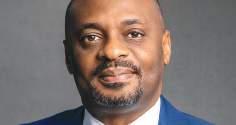
the Bank of Industry recapitalisation, according to the president, would provide affordable financing for innovation and entrepreneurship. He also said it would drive industrial growth and support local manufacturing by reducing unemployment and expanding the tax base through industrial expansion.
He stated in the letter, “Military Aviation: N120 billion will modernise Nigeria's aviation capabilities, ensuring the military remains responsive to emerging security challenges.
“A Philosophical Case for Military Expenditure:
“The foundation of a thriving nation lies in its ability to protect its citizens. No infrastructure, no innovation, and no progress can be enjoyed or sustained without security.
“The government has a constitutional obligation to secure lives and property, and military expenditure is not merely a fiscal decision – it is a moral imperative.
“By investing in our armed forces, we affirm our resolve to end terrorism, safeguard the dignity of our people, and create conditions for economic prosperity.
“This budget reflects not only our commitment to securing Nigeria today but to building a future where every citizen can live and thrive without fear.
“This allocation framework underscores the administration's dedication to fostering inclusive growth, addressing security challenges, and building resilience into Nigeria's economic fabric.”
He added, “These investments will promote stability by addressing critical infrastructure deficits, especially in underserved regions, and strengthening national security by investing in agriculture, solid minerals, and manufacturing and reducing over-reliance on oil revenues.
“Catalyse economic growth: By enhancing infrastructure, supporting SMEs, and unlocking Nigeria's vast economic potential.
“I urge the National Assembly to adopt and integrate these proposals into the 2025 Appropriation Bill, reflecting our shared commitment to national development.
“Kindly let me know if additional
information or clarification is required.” Bagudu, who spoke to newsmen shortly after seeing off Tinubu en route to France at the presidential wing of Nnamdi Azikiwe Airport, Abuja, explained the reason behind the upward review.
He said, "You will recall Mr. President submitted N49 trillion budget to the National Assembly and legislative work commenced.
"The legislative work continued with interactions between the executive and the National Assembly. The National Assembly and the Economic Management Team continued to interrogate all figures.
"In that process, the Senate Committee on Appropriation, Senate Committee on National Planning, Senate Committee on Finance established that we can generate more revenue by tasking all the institutions to do more and the Federal Inland Revenue Service confirmed the ability to do more than was submitted.
"Equally, it was established that the government-owned enterprises can contribute more revenue, as well the customs service.
“So additional revenue amounting to over N4.5 trillion was established and this was taken to the president.” Bagudu added that the adjustment of the Medium Term Expenditure Framework would follow.
He explained, "When the budget was submitted, MTEF was amended. "The MTEF that was initially approved was for a budget of less than N49 trillion, so it goes together and so the consequential amendment to the MTEF will certainly follow."
However, Chinda faulted the manner of increment of the 2025 appropriation bill.
Chinda said he was not against the budget increment, but was of the opinion that budget presentations from the executive should not come in the form of a letter.
But Deputy Speaker, Benjamin Kalu, maintained that he only read a letter from Tinubu, adding that the House, through Order 1, Rule 1, could regulate its proceeding.
Chinda said, “I just listened to
HISTORY AS DANGOTE REFINERY EXPORTS TWO CARGOES OF JET FUEL TO SAUDI ARAMCO
filed by Dangote Refinery.
In the same vein, Oando Plc, Nigeria's leading integrated oil and gas company and the country's first International Oil Company (IOC), has said it is rewarding its shareholders by offering them 1.28 billion additional shares in the form of stock dividend valued at N97.6 billion.
But President of Dangote Group, Aliko Dangote, a statement from the management of the $20 billion facility, said, revealed the export of jet fuel to Saudi Aramco on Tuesday during a visit by a team from the Nigerian Economic Summit Group (NESG) to both the refinery and Dangote Fertiliser Limited in Ibeju Lekki, Lagos.
Dangote said exporting products to the global markets, especially Saudi Aramco, was made easy because of his refinery’s world-class standards and advanced technologies.
“We are reaching the ambitious goals we set for ourselves, and I’m pleased to announce that we’ve just sold two cargoes of jet fuel to Saudi Aramco,” he was quoted as saying.
Since its production began in 2024, the Dangote refinery has steadily increased its output, and has now
reached 550,000 barrels per day, from the initial 350,000 bpd.
Dangote reiterated the importance of the private sector in national development, asserting that Nigeria’s challenges could largely be overcome by providing gainful employment to its people.
He stated that the concept of a free market should not be used as a pretext for continued import dependence, highlighting that both developed and developing nations, including the USA and China, actively protect their domestic industries to safeguard jobs and promote self-sufficiency.
Dangote also cited the example of Benin Republic, where cement imports are restricted as part of a deliberate strategy to protect local industries, despite the proximity of his Ibese manufacturing plant.
“The President (of Benin Republic) is a personal friend, and my Ibese plant is just 28 kilometres from Benin, yet they refuse to allow imports to protect their local industries, most of which are grinding plants,” he stressed.
He further emphasised that the government stands to gain
substantially when the private sector flourishes, noting that 52 kobo or 52 per cent of every naira Dangote Cement generates goes to the government.
Besides, Dangote pointed out the significant challenges involved in setting up industries in Nigeria, particularly the substantial capital investment required due to the lack of infrastructure. He stressed that investors are often forced to take on responsibilities for essential services such as power, roads, and ports –services that should be provided by the government.
In his remarks, NESG Chairman, Mr. Niyi Yusuf, commended Dangote for establishing the refinery – the largest single-train refinery in the world, stating that Nigeria needs more investments of that calibre to reach its $1 trillion economy goal.
“To achieve a $1 trillion economy, much of that must come from domestic investments. I joked during the bus ride that while others are dredging to create islands for leisure, you’ve dredged 65 million cubic tonnes of sand to create a future for the country.
“This refinery, fertiliser plant,
petrochemical complex, and supporting infrastructure are monumental. My hope is that God grants you the strength, courage, and health to realise your ambitions and that in your lifetime, a new Nigeria will emerge,” Yusuf added. He emphasised that such local industries are essential to Nigeria’s industrialisation and will help foster the growth of Small and Medium Enterprises (SMEs), adding that the NESG would continue to advocate for an improved investment climate to attract entrepreneurs, boost development, ensure food security, and address insecurity. The NESG chairman lamented that Nigeria has become a dumping ground for foreign products and stressed that the country must support its entrepreneurs to become a global player.
“It’s inconceivable that a nation of over 230 million people, with an annual birth rate higher than the total population of some countries, is still dependent on imports to feed its citizens,” he observed. Yusuf also praised Dangote’s
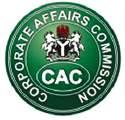
Special Guest of Honour:
His Excellenc y,
President Bola A hmed TINUBU, GCFR
President and Commander-in- Chief of the Federal Republic of Nigeria
Chief Host:
His Excellenc y, A biodun A bayomi OYEBANJI
Governor of Ekiti State Nigeria
Theme: Renewing the Pan-African Ideal for the Changing Times: The Polic y and Leadership Challenges and Oppor tunities
CONGRESS HALL, TRANSCORP HILTON HOTEL, MAITAMA, ABUJA
06.02.2025
10.00 AM
Fathers of the Day:
General (R td) Yakubu Gowon, GCFR
Chief Olusegun Obasanjo, GCFR
Dr. Goodluck Jona than, GCFR
General (R td) Muhammadu Buhari, GCFR
Chair of the Occasion:
Her Excellenc y, A mina MOHAMMED
United Nations Deput y Secretar y- General
Conveners: His Excellenc y, Dr. John ‘Kayode FAYEMI, CON Former Governor of Ekiti State
Keynote Speaker: His Excellenc y, President Thabo MBEKI, Elder Pan-African Statesman and Former President of the Republic of South Africa
Her Excellenc y, Erelu Bisi ADELE YE-FAYEMI, Former First Lady of Ekiti State
The attention of the Board of Trustees of the Peoples Democratic Party (PDP) has been drawn to a strange document
being circulated in a section of the social media purported to be the Communique issued at the end of its Emergency Meeting held on Wednesday, February 5, 2025. For the avoidance of doubt, below is the authentic Communiqué issued by the BoT at the end of the emergency meeting. The BoT urges Nigerians to disregard any other publication being circulated as the Communique.

Motto: Justice, Unity and Progress National Board of Trustees


Email: deji.elumoye@thisdaylive.com
08033025611 sms only
Chairman of United Nigeria airline and a chieftain of the all Progressives Congress in anambra State, Prof Obiora Okonkwo, in this interview bares his mind on pressing issues especially the urgent need to form a coalition of political parties with the aim of defeating Prof Charles Soludo during the state’s gubernatorial poll later in the year. David-Chyddy Eleke brings excerpts.
We have just seen you declare your intention to run for the position of governor of Anambra State, what informed this decision?
After very wide consultations, as a result of some promptings, I have taken a personal decision to run. I can easily confirm that majority of stakeholders, majority of Anambra people decided that my humble self with my level of qualification and exposure is capable of solving the endemic problems we have in Anambra State, so I am convinced that these invitations to run are genuine and that is why I have made up my mind to call my grassroots campaign organisation to tell them that I am interested in running.
I have told them I have made up my mind, and that we have work to do and that they should go out there and do what is needed, what they know how to do already.
What is your take on the zoning arrangement in the state, especially considering that it doesn’t favour you as an aspirant coming from the central zone, as people believe it is the turn of the southern zone?
As for the zoning you just mentioned, I want to tell you that the zoning formula people think we have today is not an Anambra thing. It is an internal arrangement which APGA made, and which they want to impose on our people. This state requires the best, and we must be able to send our best to represent us. Assuming there is zoning, but I’m not conceding that there
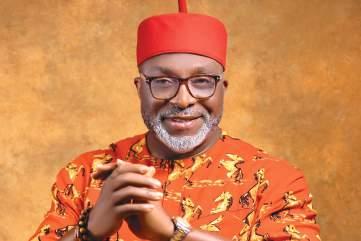
is one, it has not done us any good. If assuming there is truly zoning too, then I will tell you that it is actually the turn of the central zone because we have had Governor Willie Obiano do eight years to represent the North, Peter Obi has done eight years to represent the
central zone, and in the South, we had Governor Chinwoke Mbadinuju who did just four years and now Governor Chukwuma Soludo is about to complete the same four years for the South, that means that all zones have taken their turns, it is now the turn of the central where I come from.
So if at all there is zoning, it is to the zones and not to individuals. If at all there is any zoning, which I do not believe in, the zoning is to the favoured zone and not to any individual. So having had eight years of Peter Obi from Central, eight years of Obiano from North and Soludo completing four years for south to make it eight years, in actual sense, the people whose turn it is today are central and I’m truly from Central. However, I’m not declaring my intention based on where I come from. At this age and time, such things are mundane. It is too mundane to be talking about zoning, even if zoning is the thing for us, the South people are worse hit in the insecurity going on in the state, how have they used the power given them to better their zone? So what I have seen now with this present government of APGA, led by Soludo is that he is just massaging his ego, he does what he wants, not what is good for the people. It is very glaring that our security situation is very bad, even before the blind. He has ruined our traditional institutions, he has desecrated our sanctuaries, he is a man who stands even on the altar of God, before the blessed sacrament and dishes out information that are very condescending to the leadership of the church and even insulting people of the state. So the damage we have seen in this state under him is unequaled and I now believe that this is the time to clean it up.
on www.thisdaylive.com
Etim Etim writes that there are clandestine moves by certain individuals to cause disaffection between Governor Umo Eno of a kwa Ibom State and President of the Senate, Senator Godswill a kpabio ahead of the 2027 general election.
The 2027 political season is arriving a bit too early in Akwa Ibom State, and as usual, the starting point is mudslinging and salacious political publications targeting at the incumbent governor and his predecessor. This week, an NGO, Network Against Corruption and Trafficking (NACAT) filed a petition at the EFCC and ICPC alleging that there was ‘’wanton corruption and embezzlement of public funds orchestrated by former governor Udom Emmanuel’’.
The petition is dated January 21, 2025 and signed by its operational manager, Stanley Ugabe. A week before the petition was delivered to the anti-graft agencies; a group known as Concerned Members of the All Progressives Congress in Akwa Ibom State, wrote an open letter to President Bola Tinubu in a national newspaper of Monday, January 13, 2025, in the form of an advertorial in which it made a number of spurious allegations against Governor Umo Eno; Udom Emmanuel and Mr. Ekperikpe Ekpo, Minister of Petroleum (Gas).
The open letter alleged that the three leaders are scheming to support a PDP presidential candidate of Northern origin in 2027 and that their ultimate goal is to frustrate the re-election of President Tinubu.
The letter is copied to the Senate President, Godswill Akpabio; APC National Chairman, Abdullai Ganduje and NSA, Nuhu Ribadu. There are 10 signatories on the letter, representing the 10 federal constituencies in the state, but in actual fact, the names are all fictitious. I have been a prominent member of APC in Akwa Ibom State since November, 2014 and participated in three governorship elections since 2015 as a communication strategist. I am in a position to know at least one of 10 persons who can buy
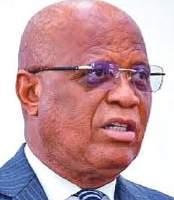
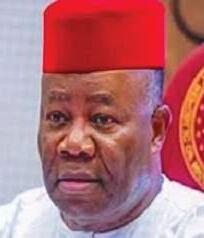
a newspaper page for N1.2 million to place an open letter to the President. Those names do not just exist. I have been well informed from within the APC that the sponsors of the advertorial are the same as the brains behind the petition against Udom Emmanuel. Their objectives are to embarrass the former governor who is a PDP leader and the political godfather of Eno; make the governor look bad before the President and create problems for the governor and his re-election bid. The last paragraph of the advertorial says it all: ‘’Given your extensive experience
in presidential politics, we trust that you won’t fall prey to Governor Umo Eno’s deception. It’s time to activate plans to win Akwa Ibom State and secure your reelection’’. There is no single mention of the Senate President, who is the leader of APC in the South-South region, in the letter apart from indicating that he was in copy. That’s quite telling!
I have spoken to a lot of people within the APC in the state and I have discovered that the advertorial was sponsored by people with two major agenda: One, they are uncomfortable with the cordiality between the Senate President and the governor which was deliberately built by the governor, contrary to traditions. They are
enraged by the simmering rumours within the APC that the governor might defect to the party, and that would upstage the existing political arrangement/structure in the APC.
The second agenda is to stop the governor from going for second term. They do not necessarily believe that he would defect; but they want Akpabio to cut all ties with him and launch a political assault to weaken him and set the stage for APC to take over the state. The thinking within this group is that if Akpabio does not deliver the governorship seat to APC, his chance of being re-elected Senate President would be slimmer. Akpabio is the only Senate President since 1999 to come from a state governed by an opposition party. Some party members believe that this is a major minus for him as far as 2027 is concerened, especially with Senator Oshiomhole poised to challenge him for the position.
The inclusion of Ekperikpe Ekpo in the publication is befuddling to many, especially those outside Akwa Ibom State. He is from the same senatorial district with Akpabio and was an Akpabio acolyte until the Senate President nominated him for the ministerial position and convinced President Tinubu to approve the appointment in spite of the need to spread appointments to other zones.
But in recent months, there’ve been speculations of a frosty relationship developing between the Senate President and the Minister due to the latter’s perceived interest in gubernatorial politics. The Minister has reacted sharply to the advertorial, stating that he is not building any alliance with anybody to sabotage Tinubu’s reelection as alleged in the publication.
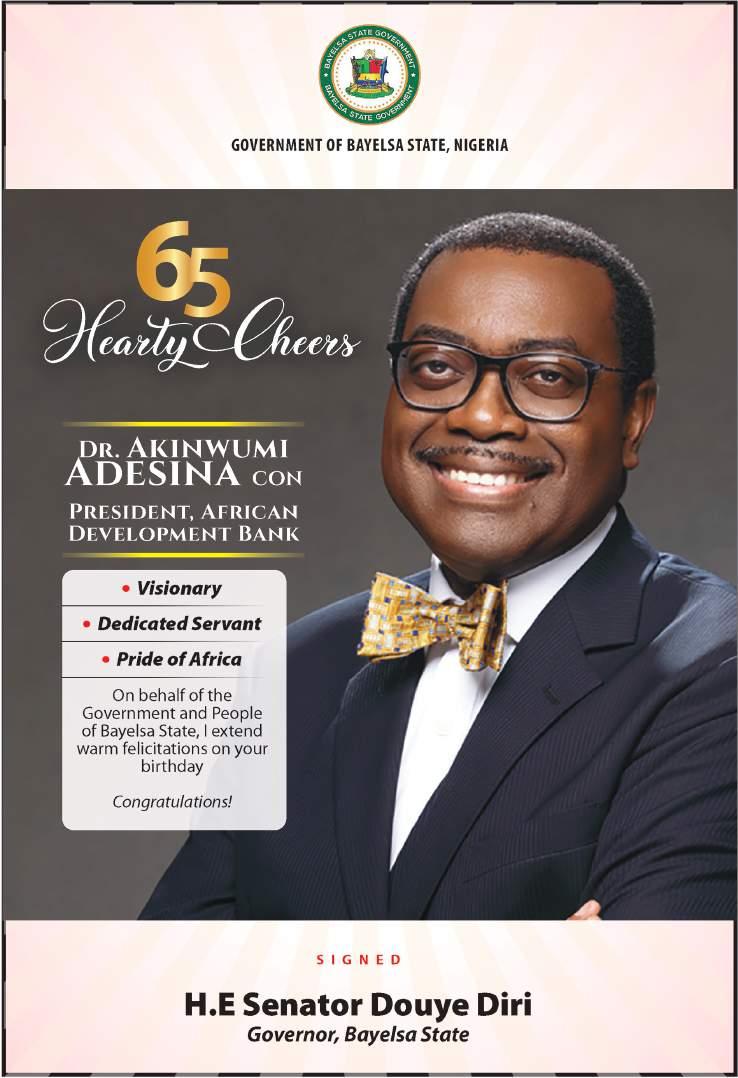
www.thisdaylive.com


opinion@thisdaylive.com
Uba Sani wins THISDAY Governor of the Year award, writes TONY ADAMS
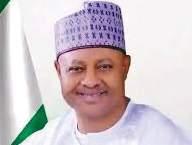
See page 20
AFRICA AND THE NIXAU TOMA SYNDROME
O. JASON OSAI urges African leaders not to allow themselves to be led into new slavery by treaties and agreements they don't understand

See page 20
EDITORIAL PDP AND THE CRISIS OF CREDIBLE OPPOSITION

Nigeria should move away from glorifying wealth and political power, and fosters values of hard work and integrity, argues PAT ONUKWULI

In the depths of Nigerian society, a silent and insidious force is stealthily and rapidly gaining power and influence. It is neither a natural disaster nor an external enemy but a cluster-created beast: cultism. Like Hydra, the many-headed monster in Greek mythology that Hercules slew, it grows its head whenever one is chopped off, feeding on the very fabric of the nation’s youth and turning them into ruthless perpetrators of violence.
Today, Nigeria faces the terrifying prospect of a future where cultism, far from being a mere criminal act, could become the very foundation of its social structure. The alarming rise in executionstyle killings across states serves as a harbinger of a much darker future if this issue is not addressed urgently and comprehensively.
Cultism in Nigeria has evolved into an uncontrollable monster, its influence stretching far beyond the confines of university campuses. It has infiltrated every corner of society, from the streets of cities to the very corridors of power. It has rooted itself in trade associations and has even penetrated secondary schools. What once began as a misguided search for belonging and power has now morphed into a gateway for more extensive criminal networks. Cultism feeds on fear, ignorance, and the desperation of those who see no other way to rise above the poverty and hopelessness that define their lives. The tragic and brutal killings reported almost daily across the nation, often tied to cultic disputes, are just the tip of the iceberg.
At its core, cultism is a battle for control, especially of drugs and influence. Rival groups fight over territory, often resorting to violence to establish dominance. Whether on campuses or in urban neighbourhoods, their methods remain the same: intimidation, bloodshed, and terror. Cultism is usually the entry point of more dastardly crimes. Cult violence has long spilt over into mainstream society, taking on new forms of political thuggery, kidnapping, assassination, economic extortion, and even terrorism.
Perhaps the most disturbing aspect of cultism’s growth is its deeply embedded culture of fear. Cults demand unalloyed loyalty from their members, binding them in blood and coercing them into committing unspeakable acts to prove their allegiance. Once initiated, members are bound by an unspoken law of silence, existing within a web of fear: fear of punishment, fear of death, and fear of ostracism.
Behind the allure of cultism lies a potent factor: the unrestrained glorification of power, wealth, and status that has permeated every level of Nigerian society. In this environment, power is not earned

through hard work or integrity; it is seized through violence, threats, and allegiances. The country’s elite set a dangerous precedent with their ostentatious displays of wealth, from flashy cars to extravagant parties. They glorify political power and success, regardless of how it is attained.
For some young people, joining a cult can seem like the only way to escape their circumstances. The promise of money, protection, and access to networks of influence is too appealing to ignore. But these youths fail to recognise the darkness lurking behind these promises. Cults, often intertwined with political and economic corruption, thrive on the misery they perpetuate. They are not the solution to poverty but an entrapment, a downward spiral of violence and crime that only breeds more violence and crime.
Cultism in Nigeria is a ticking time bomb, and unless addressed with urgency, it will tear apart the social and political fabric of the nation. This rise in cultism is not merely an academic concern but a national security threat. As these groups gain more power, they see themselves above the law. Politicians, business figures, law enforcement officers, and even religious leaders often disregard their activities out of fear or because they benefit from the power these cult groups wield. This creates a dangerous cycle where cult groups grow unchecked, strengthening their control over territories, communities, and, at times, entire states.
The recent surge in execution-style killings across the states is a glaring warning that the situation has reached a critical point. For instance, just within the week leading up to last Christmas, there were over 30 killings within the capital territory of Awka in Anambra State alone, and these were not isolated incidences. These killings are now pervasive and are often carried out with impunity. They are symptomatic of a much more significant and more deeply rooted problem. Indeed, it is a manifestation of a malfunctioning society. Left unchecked, this scourge will
undermine the very survival of the nation.
Addressing this crisis will require more than establishing current anti-cult police units or passing new laws. While such measures may provide temporary relief, they do not address the root causes of cultism. Nigeria desperately needs a complete cultural reorientation that moves away from glorifying wealth and political power and instead fosters values such as hard work, integrity, and respect for life.
The nation must foster a society that discourages flaunting wealth, idolises political office holders, and venerates wealthy individuals. Nigerian youths should be reoriented to understand that success can be achieved through honesty, education, and community building rather than through violence and criminal alliances. This shift can only occur by creating new role models who rise through effort, innovation, and the betterment of society, not through fear and exploitation. Moreover, Nigeria must invest in youth education, employment, and mentorship programmes. Cultism often thrives in environments marked by desperation, where young people feel they have no other avenue for survival. By equipping them with the skills, knowledge, and support they need to succeed, Nigeria can offer a path forward that does not involve violence or criminality.
The cycle of violence must be confronted directly. No longer can the country tolerate a situation where the vulnerable are preyed upon by those who hold power through intimidation and fear. Law enforcement must take a more aggressive stance, not only in pursuing the perpetrators of violence but also in ensuring that those in positions of power who enable or protect cult groups are held accountable. The message must be clear: no one is above the law.
Undoubtedly, Nigeria is at a crossroads. Without swift and decisive action, the nation risks descending into a state of lawlessness where violence reigns supreme. The time to sever the heads of this hydra is now. Cultism must be defeated before it consumes Nigeria's future. The country needs new policies, enforcement measures, and a fundamental shift in the mindset that has allowed cultism to grow and thrive. This is a battle for Nigeria’s soul; it can be won if the nation acts now.
The question is whether Nigeria will rise to meet this challenge or allow the darkness of cultism to extinguish the hope for a better future for its youth and its people. The future is in the hands of the Nigerian people. It is up to all stakeholders to shape a future of peace, opportunity, and justice.
Onukwuli PhD, writes from Bolton, UK patonukwuli2003@yahoo.co.uk

That Kaduna State governor, Senator Uba Sani, emerged THISDAY Governor of the Year would not come as a surprise to close watchers of recent happenings in the country. The award was merely a recognition of the doggedness to excellence which has trailed Sani’s administration since he assumed office on May 29, 2023.
At the 30th anniversary of THISDAY on Monday, January 27, 2025 at Eko Hotel, Lagos, it was a gathering of Nigeria’s elite, a huge chunk of the ‘Who is Who’. Presenting the plaque as Governor of the Year to Sani was former Secretary General of the Commonwealth, Sir Emeka Anyaoku.
"I have not had the privilege of visiting Kaduna in recent times but from all the reports that reach me, Governor Sani is doing extremely well, particularly in the area of security," said Anyaoku. "And so, I would like to wish him continued success."
Of course, that Kaduna is becoming more secure cannot be overstated. Just two years ago, there were places people feared to go. Places where even those that resided there, left. It was not until the implementation of the 'Kaduna Model' that peace, law and order were restored. For those who don't know, 'Kaduna Model' is the structure designed by the Sani administration which sought the co-operation and collaboration of different stakeholders in the communities with state and federal security organisations like the army, police, air force, immigration, NSCDC, vigilantes and even Department of State Services (DSS). The parley resolved a joint strategy which chased out the bandits and terrorists with majority repenting while the unrepentant ones were meeting their waterloo. The success of this effort is the peace Kaduna residents are enjoying.
And THISDAY has done well in giving Sani his flowers. The Publisher of the newspaper, Nduka Obaigbena, described Sani as 'very frugal in managing resources' and 'gradually restoring peace to Kaduna.' According to Obaigbena, "without peace, there can be no development."
Responding, Sani thanked the organisers of the award. "I'm deeply humbled to stand before you today to receive this award," Sani said, appreciating the organisers of the award and everyone present "In Kaduna, the focus is trying to run an all-inclusive government with justice, equity and fairness as the condition for peace and progress. That is the reason that today in Kaduna, we're experiencing this very peace. I would like to dedicate this very important award to the good people of Kaduna that sustained support to our administration. We would also try as much as possible to continue to work for everybody irrespective of religious, political or ethnic affiliations."
In a season of recognition, a few days after the THISDAY award, Sani was also conferred an Honorary Doctorate Degree in Entrepreneurship (Honoris Causa) by the Federal University of Technology, Minna in Niger State. It was at the university's 33rd Convocation Ceremony. According to the university, the award recognises the governor's 'lifetime dedication to entrepreneurship, human capital development, and economic empowerment.' Again, while thanking the FUT Minna Governing Council, Senate, Management, and Staff, Sani stressed the need for policymakers to focus on Research and Development (R&D).
“We must prioritize institutions like FUTMINNA because they hold the key to our technological breakthrough," he said.
"Researchers in our universities are creative, innovative, and committed, but funding has always been the major constraint.”
For Sani, it was not about making a fine speech. In Kaduna, his administration is walking the talk. Kaduna State government is building three Vocational and Technological Skills Acquisition Cities, which are expected to train at least 12, 000 youths annually for employment in various industries.
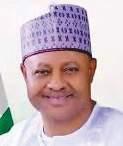
The famous Panteka Market is already being turned around to become a major skills acquisition centre with capacity to engage over 38,000 artisans.
“We are carrying out a comprehensive infrastructure upgrade at Panteka Market to make it an international hub for skills training and job creation,” he noted, also disclosing plans for a strategic partnership with FUT, Minna.
Recall that recently, the Sani-administration embarked on building three Vocational and Technology Skills Acquisition Centers in Soba, Igabi, and Zangon Kataf local government areas to skill up its residents. According to a statement by the Commissioner for Business Innovation and Technology, Mrs. Patience Fakai, the initiative reflects the administration's policy of enhancing Human Capital Development. Mrs. Fakai said that Governor Sani has already established the Skills Development Council, which includes her Ministry, the Ministry of Sports Development, the Ministry of Local Government Affairs, and the Ministry of Human Services and Social Development. Recall that Kaduna State had embarked on remodelling Panteka Market to be a major skill acquisition hub which would engage about 40, 000 artisans.
Speaking on these developments, Mrs Fakai disclosed that the Executive Secretary of the National Board for Technical Education (NBTE), Prof. Idris Bugaje, is being carried along so as to provide Nigerian Skills Qualifications Framework (NSQF) certification for graduates of the three skills centres and Panteka Market.
The governor has also demonstrated his entrepreneurial acumen. Is it his intervention in agriculture or mining? Under him, the state has intervened by providing smallholder farmers assistance in the form of seedlings, equipment and fertiliser. Over 60 rurals are being built to ensure farmers have access to the markets. It has also partnered with companies to increase the agricultural value chain. The mining sector has also seen Kaduna ink partnership deals with different foreign companies to mine resources, particularly, Lithium, in an ethical and mutually beneficial manner. Under his administration, nine general hospitals have been rebuilt. Basic education has also gotten a boost with more schools, buildings as well as school attendance. And with security of lives and property becoming more guaranteed, social activities are on the rise. In fact, Sani has done phenomenally well, hence he gets praises from different corners. Everyday people on the streets commend him. His political peers on the same divide use him as an example. Those against him are green with envy. According to Yakubu Waziri, an aspirant for the Chikun/Kajuru House of Representatives Seat under the All Progressives Congress (APC), Governor Uba Sani has squashed all opposition parties in the state.
Adams writes from Kaduna
O. JASON OSAI urges African leaders not to allow themselves to be led into new slavery by treaties and agreements they don't understand
The 1980 Box Office comic movie “The Gods Must Be Crazy” garnered over $200m. Meanwhile, Nixau Toma, the lead actor, was paid $300 for his role; he died a wretched poor man in 2003 at 59 years. How so? Nixau was hugely exploited at the negotiation table; he was merely told what was negotiated by his managers and he accepted gleefully. Why? He lacked the necessary knowledge, information and skills to understand what he was going into; he did not realize that he was exploited.
The experience of Nixau Toma is symbolic of the African experience in world trade and international relations over the centuries. Granted that in antiquity, King Jaja of Opobo, King Koko of Brass, Oba of Benin and monarchs of other African nation states signed treaties without understanding the language and content of the treaties, but that was in the distant past. The tragedy is that the scenario has not only persisted but has intensified in occurrence and degree to the point the East has joined the West in condemning Africa as the global source of mineral resources with no regard whatsoever as to how it affects Africans. This policy and attitudinal posture is captured in Gerald Ford’s infamous averment that “We want Africa without the Africans”.
France depends on Niger for 30% of uranium to power its people and economy 24/7 while 70% of Nigeriens live without electricity. The US has joined the fray given her strained relationship with Russia, and has doggedly protected its drone base in Niger in a facility the Nigeriens are barred from entering. Today, battle ready French soldiers routinely stop and search Ivorian motorists on the streets of Côte d’Ivoire. In Ghana, Terminal 1 at Kotoka International Airport has been farmed out to the US military. Ghanaian Customs is not stationed there; so, Ghanaian government does not know what comes in and goes out of Ghana through that terminal; even the Ghanaian president does not have access to it. Based on subsisting treaty, US soldiers enter in and out of Ghana without passport and Ghanaians are not allowed to seek legal redress if a US soldier or equipment kills them or destroys their property.
In South Africa, China has bought over vast land and established Chinese enclaves where South Africans can’t go. Unlike what obtains in the various China Towns in the West where the hosts’ law enforcement agencies are in control, the Chinese establish their own law enforcement systems and operatives in Chinese enclaves in Africa.
China has 20 police stations in South Africa to protect the Chinese and their businesses. China has four Generals in Zambian Army to protect the Chinese. The Mayor of Lusaka was once sanctioned by the Zambian President for speaking against a Chinese who refused a Zambian from entering a Chinese eatery to eat. A directive from the Zambian presidency instructed the Mayor to apologize to the Chinese.
Unlike Europe and America, China is not in Africa to colonize, install puppets as heads of state and puppeteer from a distance. No; China is in Africa to stay. Out of the desperation as a result of population explosion, China is in Africa for space to accommodate its overflowing population. The Chinese are feverishly purchasing land and establishing farms and firms to prosper its people in a multiplicity of China Towns in Africa. They are here to occupy and take charge in a new form of colonization that borders on slavery. From all indications, China perceives Africa as a future slave colony.
Like Nixau Toma who nodded to an agreement he couldn't read and so didn’t understand, African leaders are signing treaties written in Mandarin, a language that is alien to Africa. The Sino-Nigeria agreements and treaties reached and executed
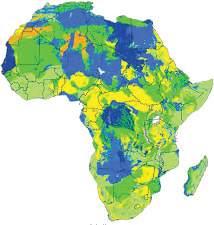
during the Buhari Administration were written in Mandarin. This emphasizes the Nixau Toma syndrome.
The questions are therefore asked: Where lies the sovereignty of Niger, Cote d’Ivoire, Ghana, Zambia, South Africa and other African countries that have been hoodwinked into signing agreements and treaties that farm out portions of their territory without understanding the letters, languages and spirit of the bilateral documents? Almost one-half a century after “The Gods must be crazy”, is the Nixau Toma syndrome not afoot in Africa? Are Africans whose ancestors were led in chains into slavery by the West not allowing themselves to be led into new slavery by treaties and agreements they don't understand?
African leaders must demonstrate the capacity to lead futuristically; they must be generational thinkers who must be conscious of the fact that Africa is not a bequeathal from our ancestors but an estate they are holding in trust for future generations. Is Africa not under a curse that ensures leadership by idiots?
In “Redemption Song”, Bob Marley urged thus: “Emancipate yourselves from mental slavery; none but ourselves can free our minds”. Africans and their leaders must heed Marley’s call, which emphasizes the fact that the process of emancipation is the responsibility of the ones under the stranglehold of slavery, either physical or mental. Let me reiterate an earlier averment thus: “You can break the chains from the wrists and ankles of a slave but it is only the slave that can break the chains of his mental slavery”.
Globalization has shrunk planet earth into a global village and the information highway of the Internet has made it possible and easy for the slightest ripples on the banks of Cape Coast, Ghana at the eastern shores of the Atlantic Ocean to be felt instantaneously at the beaches of Rio Janeiro, Brazil at the western banks of the Atlantic. Today, a yodel in San Francisco is instantaneously heard loud and clear Downtown London.
African leaders must brace up and lead responsibly in a world that has degenerated to the Hobbesian state of nature.
Prof Osai writes from Rivers State University of Science and Technology, Port Harcourt

Editor, Editorial Page PETER ISHAKA
Email peter.ishaka@thisdaylive.com
The main opposition party should put its house in order
State governors under the platform of Peoples Democratic Party (PDP) rose from a closed-door meeting in Asaba, the Delta State capital last weekend to endorse former Youth Leader, Sunday Ude-Okoye as the national secretary. This was after a meeting of the party’s 79th Board of Trustees (BOT) in Abuja degenerated into chaos. Ude-Okoye was attacked and forced out of the BoT meeting by thugs. The development prompted a chieftain of the main opposition party, Olabode George, to warn against becoming “an agbero party”. While a semblance of order was restored after the intervention of security agencies, the crisis within the party is far from being over.
The controversy started last February when the PDP leadership in the South-east zone asked the National Working Committee (NWC) and other organs of the party to ratify Sunday UdehOkoye as the national secretary in accordance with the party’s constitution. The substantive occupant of the position, Samuel Anyanwu had stepped aside to contest the November 2023 Imo State governorship election which he lost to the incumbent governor, Hope Uzodinma of the All Progressives Congress (APC). But Anyanwu has refused to relinquish his position, even when the Appeal Court in Enugu confirmed Ude-Okoye as the National Secretary. Meanwhile, Anyanwu has obtained a counter judgment from the Court of Appeal in Abuja, instructing him to remain in position pending a Supreme Court decision. This perhaps prompted Anyanwu’s loyalists to physically haul Ude-Okoye from the BOT meeting last week. Unfortunately, the PDP has long been at war with itself. Inability to abide by its own rules has been its greatest undoing. Party leaders openly prioritise their ambitions in flagrant disobedience to its own constitution. As a result, the party is in disarray, torn apart by self-inflicted crises. Besides disagreements on the position of the National Secretary, the rift
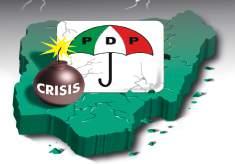
between some powerful members as well as in the ongoing zonal congresses within the party are all undermining the party. Unfortunately, the bickering and infighting are not about the interest of the people but rather about cold calculations for the 2027 general election.
In a democracy, opposition parties are expected to offer credible alternative to the governing party and enhance transparency and accountability in governance
T H I S D AY
EDITOR SHAKA MOMODU
DEPUTY EDITOR WALE OLALEYE
MANAGING DIRECTOR ENIOLA BELLO
DEPUTY MANAGING DIRECTOR ISRAEL IWEGBU
CHAIRMAN EDITORIAL BOARD OLUSEGUN ADENIYI
EDITOR NATION’S CAPITAL IYOBOSA UWUGIAREN THE OMBUDSMAN KAYODE KOMOLAFE

EDITOR-IN-CHIEF/CHAIRMAN NDUKA OBAIGBENA
GROUP EXECUTIVE DIRECTORS ENIOLA BELLO, KAYODE KOMOLAFE, ISRAEL IWEGBU
DIVISIONAL DIRECTORS SHAKA MOMODU, PETER IWEGBU, ANTHONY OGEDENGBE
DEPUTY DIVISIONAL DIRECTOR OJOGUN VICTOR DANBOYI
SNR. ASSOCIATE DIRECTOR ERIC OJEH
ASSOCIATE DIRECTOR PATRICK EIMIUHI
CONTROLLERS ABIMBOLA TAIWO, UCHENNA DIBIAGWU, NDUKA MOSERI
DIRECTOR, PRINTING PRODUCTION CHUKS ONWUDINJO
TO SEND EMAIL: first name.surname@thisdaylive.com
Letters to the Editor
in response to specific publications in THISDAY should be brief (150-300
and
Today, Nigerians who look up to the PDP to anchor responsible and virile opposition that can articulate alternative policies and views are getting increasingly disappointed. The PDP has repeatedly failed in adhering to its internal rules as they affect the filling of vacancies in the NWC of the party. For instance, the provisions of the party’s constitution are precise on ‘Micro zoning’. The acting National Chairman of the party, Iliya Damagun ought to have stepped down for someone to emerge from the North Central Zone, to serve out the tenure of the former substantive national chairman, Iyorchia Ayu. Damagun is from the Northeast Zone. Like Anyanwu, he has been using the courts to stay put and undermine the party. In a democracy, opposition parties are expected to offer credible alternative to the governing party and enhance transparency and accountability in governance. By playing their role effectively, they help to put the people in power on their toes. It is therefore in the interest of our democracy that there be credible opposition platforms that can effectively respond to the excesses of the ruling party to safeguard the integrity of the political process. Bu the dysfunctionality is systemic. Even the ruling APC is coherent in appearance mostly because it is in power and has patronage to share. In real terms, our parties have no belief content and are only equal to the superficiality of their principal members. It is therefore difficult to even speak of viable opposition parties when no one knows what the ruling party stands for.
In essence, while we lament the disarray within the PDP, what requires serious homework is the meaning, content and substance of our political parties.
to the point. Interested readers may send such letters along with their contact details to opinion@thisdaylive.com. We also welcome
and opinions on topical local, national and international issues provided they are well-written and should also not be longer than (750- 1000 words). They should be sent to opinion@thisdaylive. com along with photograph, email address and phone numbers of the writer.
The federal government does not encourage investments in the Nigerian economy, one way or the other. Cronies of the sitting president desire to rip off potential investors whilst commerce departments plus governments at the state and local levels impose overlapping taxations. Ultimately, well-intentioned business endeavours go kaput except for a few import-centred outlets engaging in just buying goods from overseas and selling these essential commodities to the wretched locals in-country; these simplistic merchandising businesses are owned by those aforementioned cronies. A country plagued by such business climate (Nigeria, for instance) may be fortunate by relying solely on revenues from export of petroleum but the people are poorer as a consequence.
Now, when a so-called anti-corruption agency of the federal government (not the Serious Fraud Office of the police, mind you) becomes a veritable scheming Tom-the-cat and investments and other portfolios especially in the real estate sector
become collective the less than spunky Jerry-themouse, then this is bad for the economy. Reality must be something like this: if there are weak oversight mechanisms in place to check official thievery of public funds then there should be very little the government can do to punish those who have pillaged the treasury and chose to invest in the local economy. Otherwise, there is the risk that they’d be chased abroad with the loot. This is ongoing. What the EFCC does in essence is re-steal recovered stuffs from theft committed by public-office thieves. This becomes a social vicious cycle. Methinks the EFCC should not have hollered about those 750 duplex apartments at Abuja alleged to be the asset of a former public official for if those housing units were put in the market the housing sector will experience boom.
Sunday Adole Jonah, Department of Physics, Federal University of Technology, Minna, Niger State
The latest press conference with Presidents Trump and Netanyahu produced a few surprises, several horrific and almost all certainly illegal.
Donald Trump has announced the best solution to the problems of the Gaza Strip will be to "take over" the region and the Palestinian people will be moved away. The displacement of people on the basis of race as happened with Australia and the aboriginal people and the First peoples of America, being sent to settlements is that they lose their connection to land, their culture, their health and basically their heart.
The suggestion of sending in the military to achieve this is a war act or at least an invasion but Trump stated "We'll do what's necessary."
His reason for this includes "They live like they’re living in hell. Gaza is not a place for people to be living". It is a place of hell at the moment, a "demolition site" but by that logic a lot of people from Los Angeles are going to be deported too, maybe to Canada or Mexico.
Netanyahu's optimistic view is that the Gaza Strip will be a “Riviera.” and yet at initial view it doesn't look the same, nor I think will it ever.
It is also a warning to other countries as the count could increase swiftly from the original 50 states with 51-Canada, then 52-Greenland and maybe 53-Gaza and even 54-Ukraine. It's not a funny joke when it could become true.
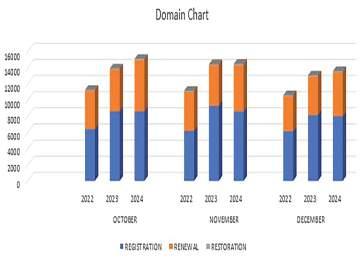
Emma Okonji
The total figure for the registration, renewal and restoration of Nigeria’s .ng domain name dropped slightly in December last year to 229,583, after recording a slight increase in the months of October and November last year, which was put at 230,454 and 231,853 respectively.
This is according to the latest statistics released by the Nigeria Internet Registration Association (NiRA), the body responsible for managing Nigeria’s country code Top Level Domain (ccTLD).
THISDAY analysis of the numbers showed slight increase of 228,775 and 230,232 for August and September last year respectively, up from the 226,454 it recorded in July last year.
According to the statistics, the total .ng domain name registration, renewal and restoration, reached 226,454 in July 2024, and further increased in August and September 2024 to 228,775 and 230,232 respectively. In October and November 2024, the figures increased again to reach 230,454 and 231,853 respectively, before sliding to 229,583 in December last year.
THISDAY had last year, reported an initial steady growth of Nigeria’s .ng domain name, which grew from 212,890 in December 2023 to reach 215,496 in January 2024, before increasing again to 217,527 in February 2024, with a further increase to 220,216 in March 2024, and another increase to 222,820 and 223,891 in April and May 2024 respectively,
before reaching 226,702 in June 2024, but dropped slightly to 226,454 in July 2024.
Although the summation of .ng domain name includes registration, renewal and restoration, but the latest statistics on Nigeria’s .ng domain name as released by NiRA, showed that registration alone reached 8,589 in October 2024, but dropped to 8,561 in November 2024, with a further drop to 7,979 in December 2024. The .ng domain name renewal alone was 6,349 in October 2024, but it dropped to 5,726 in November 2024, with a further drop to 5,424 in December 2024, while the .ng domain name restoration alone was 148 in October 2024 and it increased further to 176 in November 2024, before sliding to 165 in December 2024.

The ccTLD .ng domain name is Nigeria’s identity in cyberspace, which has the .ng at the suffix of every official email address that originates from Nigeria. In the United Kingdom, all official email addresses end with .co.uk. In United States of America, they end with .com, while in South Africa, the official email addresses end with .co.za. Nigeria had initially maintained a steady growth in the adoption and usage of .ng domain name across different sectors of the economy and the growth attracted commendations from the global community of Internet Corporation for Assigned Names and Numbers (ICAN) last year.
ICAN commended Nigeria last year for surpassing the 225,000 mark
for all registered .ng domain names in the country, when Nigeria attained the 226,702 in June last year. But according to the recent statistics from NiRA, Nigeria has further populated its .ng domain name registration from August to November last year, before sliding slightly to 229,583 in December 2024.
Speaking about NiRA’s commitment to driving .ng domain adoption and advancing Nigeria’s digital landscape, President of NiRA, Adesola Akinsanya, said NiRA, organised an online accredited registrars forum held last year, which brought together, all accredited registrars, who were crucial to the success of the .ng domain. According to him, the accredited registrars act as the vital bridge between the registry
and the registrants, ensuring the smooth operation and widespread adoption of the .ng domain. He also explained how NiRA also organised the .NG Academy’s Street Digital Skills Project last year, an initiative that conducted two impactful career talks at Government Technical Colleges in Lagos—specifically at Technical College Ado-soba and Agidingbi. According to him, the initiative aims to contribute to digital skillbuilding in the informal sector, empowering young individuals with the knowledge and tools necessary to thrive in the digital economy.
Emma Okonji
Given the importance of broadband in driving digital connectivity across sectors of the Nigerian economy, the CEO, Financial Derivatives Company, Mr. Bismarck Rewane, has said further investment in broadband will create more technology jobs and drive demand for digital skills.
Rewane disclosed this at the launch of the National Broadband Alliance for Nigeria (NBAN) by the federal government in Lagos, while moderating a panel session that discussed the challenges and
ways forward for a digitally connected Nigeria. According to him, expanding rural broadband will promote inclusive access empower underserved communities with education, healthcare and economic opportunities. He said investment in internet infrastructure and broadband connectivity would increase data consumption by Nigerian businesses and individuals, adding that with the right investment, the Nigerian telecoms contributions to Gross Domestic Product (GDP) can be increased from 12.1 per cent in 2024 to 16.8 per cent by 2028.
“Global information technology spending is expected to rise by 9.3 per cent from 7.2 per cent last year and the key areas are Data center systems, Software enterprise, Artificial Intelligence (AI) technology, Deepstick technology and navigation activities, Cloud services, Cybersecurity, and e-Commerce.
“If Nigeria is going to achieve a $1 trillion economy in the next 10 years, then we have to start working towards achieving it now. Nigeria secured a grant of $500 million from the World Bank for its metro expansion, and it’s
expected to deliver 1.5 per cent of GDP growth per year and raise the income per capita of Nigeria over the next four years, directly and indirectly,” Rewane said.
Speaking about the impact of increased connectivity and internet penetration on Agriculture, Oil and Gas, Manufacturing, and Commerce, Rewane said it has impacted these sectors in several ways, and gave instances of e-Commerce growth and the growth of mobile payment, which according to him, mobile payment system has gone from $13 trillion in 2020 all the way to $78 trillion in
2024, while instant payment alone has reached $17 trillion, which he projected to reach $1 quadrillion at the end of next year.
He however said the major challenges facing Nigeria today, were income inequality and opportunity inequality. “The only way to bridge that gap is to have affordable, accessible connectivity so that people can actually increase their productivity, and we have to go beyond talking and acting,” Rewane further said.
The panel session which was moderated by Rewane, had Governor Abdulrahman
Forum
Commissioner for Innovation,
Eromosele Abiodun
Trucks Transit Parks Ltd (TTP), has announced the successful integration of the Central Bank of Nigeria’s (CBN) Nigeria Export Proceeds (NXP) system with its innovative Ètò electronic call-up platform.
The company in a statement said, “This strategic integration, which became effective on January 3, 2025, represents a significant collaboration between TTP, the Nigerian Ports Authority (NPA), the Central Bank of Nigeria (CBN) and other key stakeholders, aimed at modernizing & streamlining Nigeria’s export operations, enhancing transparency, efficiency, and overall operational excellence at the nation’s ports.
“Under the new regulation, exporters are now mandated to secure an approved NXP application number before booking export consignments. This requirement, endorsed by the NPA and aligned with government directives, ensures that only consignments with verified, final-stage approval proceed to export processing.”
The company added that the collaborative efforts between it, the Nigerian Ports Authority (NPA), the CBN and other key players underscore a shared commitment to enhancing the export value chain in Nigeria.
“The NPA’s proactive role in shaping and enforcing these new guidelines, coupled with TTP’s innovative technological contributions, promises to establish a more secure, efficient, and competitive environment for export operations and by extension, port operations. This partnership highlights a forward-thinking approach to tackling logistical challenges and promoting sustainable economic growth,” it said.
The statement added that the new procedure for export bookings promises to enhance process efficiency by minimising processing delays at export processing terminals, ensuring that export containers are only released to the port upon confirmation of their status at the final approval stage.
“It will also reduce road congestion as export vehicles would now complete their reloading processes before proceeding to the port. In addition, it will bolster the Nigerian economy as a streamlined export process will enhance international competitiveness, attract more business, and generate higher revenue for the nation,” the statement added.
Managing Director and Cofounder of TTP, Jama Onwubuariri, commented: “Our team’s relentless pursuit of technological excellence has culminated in a solution that not only streamlines the export process but also reinforces the collective efforts of industry regulators and stakeholders, notably the NPA. We are honoured to collaborate closely with the NPA, the CBN and other partners in ensuring that this integration sets a new benchmark for operational excellence in Nigeria’s export sector. This achievement is a testament to what can be accomplished when cutting-edge technology meets proactive regulatory oversight.”
Stories by Emma
Okonji
Sophos, a global leader of innovative security solutions for defeating cyberattacks, has released a new report, tagged: “Beyond the Hype: The Business Reality of AI for Cybersecurity,” which surveyed 400 IT leaders on their use of Artificial Intelligence (AI) in security.
According to the survey, despite 65 per cent having adopted Generative Artificial Intelligence (GenAI), 89 per cent of IT leaders are concerned that flaws in GenAI cybersecurity tools could put their organisations at risk.
The new Sophos X-Ops research, which also released another report tagged: “Cybercriminals Still Not Getting on Board the AI Train (Yet),” said had been a slight but noteworthy shift in the way cybercriminals use AI. After investigating several underground forums, Sophos X-Ops found that, while there’s
still skepticism about GenAI, some criminals are using it to automate mundane tasks, such as crafting bulk emails and analyzing data. Others are incorporating it into spam and social engineering toolkits.
Analysing the reports, the Director, Global Field CTO at Sophos, Chester Wisniewski, said: “As with many other things in life, the mantra should be ‘trust but verify’ regarding generative AI tools. We have not actually taught the machines to think; we have simply provided them the context to speed up the processing of large quantities of data. The potential of these tools to accelerate security workloads is amazing, but it still requires the context and comprehension of their human overseers for this benefit to be realised.”
With some form of AI embedded in the cybersecurity infrastructure of 98 per cent of organisations surveyed, IT leaders expressed concern about potential overreliance on AI, with 87 per cent of respondents stating they were concerned about a resulting lack of cybersecurity accountability.
According to the reports, while large organisations with more than 1,000 employees are prioritising improved protection, respondents with 50-99 employees rated reducing burnout as their top desired benefit from GenAI tools.
However, complicating matters, across all sizes of organisations, 84 per cent of leaders surveyed said they were concerned about pressure to reduce cybersecurity professional headcount due to unrealistic expectations about AI’s abilities to replace human operators.
Agnes Ekebuike
Systegra Technologies Limited, a subsidiary of Interswitch Group and a Tier-5 Mobile Virtual Network Enabler (MVNE), has collaborated with Amdocs to offer mobile services in Nigerian market.
Systegra Technologies will enable Tier 1, 2, and 3 Mobile Virtual Network Operators (MVNOs) to offer their mobile services, enriching Nigeria’s fast-growing mobile market with
The US-based Project Management Institute (PMI), the leading authority in project management, will showcase industry-leading certifications and offerings tailored for technology professionals, entrepreneurs, ecosystem builders, and innovators at the Tech Revolution Africa Conference 2025.
PMI’s participation at the event reflects its focus on connecting with a diverse audience critical to Africa’s technological growth.
PMI helps address these challenges by fostering a workforce capable
a diverse portfolio of products, services, and offers.
As an MVNE, Systegra Technologies will utilise the Radio Access Networks (RAN) of leading mobile operators, while deploying its own advanced Switching and Business Support Systems (BSS), including an Online Charging System (OCS). This setup enables prospective MVNOs to connect and launch their services effortlessly within weeks, offering flexible services without the need for heavy infrastructure
investment.
Giving details of the collaboration, Group Managing Director and Chief Executive Officer at Interswitch Group, Mitchell Elegbe, said: “After evaluating numerous vendors with excellent solutions, Amdocs convinced us with their multi-tenant capabilities, ease of connection, ultimate flexibility, and rapid time-to- market.
Their ConnectX platform aligns perfectly with our vision to provide MVNOs and end-users with an unmatched digital experience.”
of managing projects in an agile, cost-effective, and scalable manner. Digital transformation initiatives require a combination of strategic oversight and precise execution, making certified professionals uniquely equipped to lead in this space.
Managing Director, sub-Saharan Africa, PMI, George Asamani, said: “Technological innovation is accelerating across Africa, creating both opportunities and challenges. At PMI, we are dedicated to empowering
the tech ecosystem with the skills and certifications to manage this complexity, deliver successful projects, and shape a brighter future.”
At the event, PMI will showcase its globally recognised certifications, such as the PMP, Certified Associate in Project Management (CAPM), as well as its dynamic Membership benefits and PMI Infinity™ 2.0, an AI-powered project management coach designed to deepen expertise, master complex topics, and elevate execution to drive project success.
financial statements were approved by Board of Directors on 30th




A Mutual fund (Unit Trust) is an investment vehicle managed by a SEC (Securities and Exchange Commission) registered Fund Manager. Investors with similar objectives buy units of the Fund so that the Fund Manager can buy securities that willl generate their desired return. An ETF (Exchange Traded Fund) is a type of fund which owns the assets (shares of stock, bonds, oil futures, gold bars, foreign currency, etc.) and divides ownership of those assets into shares. Investors can buy these ‘shares’ on the
floor of the Nigerian Stock Exchange.
A REIT (Real Estate Investment Trust) is an investment vehicle that allows both small and large investors to part-own real estate ventures (eg. Offices, Houses, Hospitals) in proportion to their investments. The assets are divided into shares that are traded on the Nigerian Stock Exchange.
GUIDE TO DATA:
Date: All fund prices are quoted in Naira as at
February-2025, unless otherwise stated.
Ebere Nwoji
The National Insurance Commission(NAICOM) and the Nigeria Police Force (NPF), have inaugurated a joint committee on enforcement of compulsory insurance laws.
Speaking at the inaugural meeting in Abuja, the Commissioner for Insurance, Mr Ayo Omosehin, said the development was collaborative move of by the duo to strengthen insurance compliance in the country and the announcement by the Inspector General of Police on the enforcement motor of vehicle insurance effect from February 1, 2025,
Represented by the Deputy Commissioner for Insurance,
Finance and Administration
Mr. Ekerete Ola Gam-Ikon, he said one of the objectives of the committee inauguration was to develop and implement strategies for enforcing compulsory insurances in Nigeria.
The Police Force team was led by DCP Mallum Maina. According to NAICOM, other objectives of the committee were to ensure compliance with compulsory insurance policies as mandated by the Insurance Act and other related laws.
The committee was also to foster synergy and collaboration between NAICOM and NPF, provide training and capacity-building programs for personnel of both organisations on compulsory
insurances among others.
NAICOM, highlighted the scope of operation of the committee as evaluating existing challenges in enforcing compulsory insurances and propose solutions, developing protocols for joint enforcement operations of compulsory insurances, recommending policy reforms to strengthen insurance compliance, undertake public sensitisation programs on compulsory insurances, develop training programs for personnel of both organisations on compulsory insurances.
The commission said the joint committee’s inauguration marked a significant step towards ensuring that all vehicle owners comply with compulsory insurance laws.
Access Bank Plc has reinforced its leadership in sustainable finance and climate action as the Gold Sponsor of the Nigeria Climate Change Forum (NCCF) in Abuja, which brought together Africa’s most influential policymakers, global investors, and sustainability pioneers to drive urgent action towards a net-zero future for the continent.
At the NCCF, Executive Director of Risk Management at Access Bank, Dr. Gregory Jobome, delivered a compelling presentation on, “The Role of Innovation and Technology in Africa’s Net-Zero Transition.”
He emphasised the urgency
for Africa to leapfrog traditional development models by leveraging cutting-edge technology and sustainable finance to accelerate the transition to clean energy.
Jobome also highlighted Africa’s heightened vulnerability to climate change, particularly in scenarios where global temperatures exceed 1.5°C. He called for urgent, transformative action to mitigate risks and ensure climate resilience.
During a high-level panel discussion, the Access Bank Group Head of Enterprise Risk Management provided insights on unlocking financing for renewable energy projects in Nigeria. The session show-
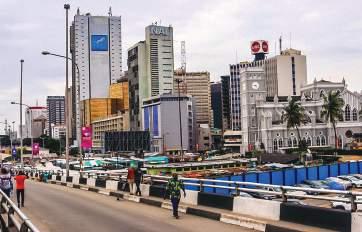
cased the Bank’s leadership in pioneering sustainable financing solutions, including green bonds, blended finance, and public-private partnerships (PPPs), outlining a roadmap for Africa’s energy transition.
“Africa is experiencing a wave of innovation and technological advancement, much of it in collaboration with global partners. However, we are still at an early stage. To create meaningful opportunities for the continent’s rapidly growing youth population—who are eager to engage in the green economy—we must scale up efforts. Financial institutions have a pivotal role to play in this transformation,” said Dr. Jobome.
The Nasarawa State Government has secured a $160,000 grant from the African Climate Foundation to develop a Climate Investment Platform (CIP) aimed at boosting clean energy solution to the effect of climate change.
The Managing Director of Nasarawa State Investment Development Agency (NASIDA), Mr Ibrahim Abdullahi, stated this at a stakeholders’ engagement on the CIP project on Monday in Lafia.
Abdullah said that the CIP would serve as a hub to pull together projects that would key into the state’s ambition of
transitioning to cleaner energy solutions.
He said the CIP project being implemented by Murty International, would enhance climate-smart agriculture, construction and other climatesmart initiatives.
He explained that the project involved development of strategic policy documents and actions plans for emission reduction, capacity building for businesses to support climate-smart investments and guide climate action in Nasarawa State. According to Abdullahi” Nasarawa is the first state in Nigeria to develop the CIP. The CIP is a key component of a
broader strategy to position Nasarawa State as a leading destination for climate-smart investment,” he said.
Mr Sesan Adedapo, from Murty International, the implementing firm, said the project include creating a science-based climate policy and action plan for Nasarawa State.
Also speaking, Dr Adnan Aminu, the Project Consultant, said the stakeholders’ engagement was meant to gather their insight on climate investment needs, priorities and challenges across key sectors - Agriculture, Transportation, Energy, Waste management, Commerce and Industry.
Ebere Nwoji
Leadway Group, one of Nigeria’s non-banking financial services provider, has launched a nationwide retail campaign to drive financial inclusion and enhance awareness of its comprehensive suite of insurance solutions.
The company said the initiative underscored its commitment to delivering accessible and tailored financial products designed to meet the diverse needs of Nigerians.
It said the campaign, tagged “No Looseguard”, is a collaborative effort among Leadway Group’s five subsidiaries and business extensions which include Leadway Assurance
Company (LAC), Leadway Asset Management (LAM), Leadway Pensure (LP), Leadway Capital and Trust (LCT), and Leadway Health (LH). Together, these entities offer a holistic approach to financial security and wellbeing, ensuring that Nigerians have access to robust insurance, investment, pension, trust, and health solutions.
Leadway said the campaign aimed to educate Nigerians on the importance of proactive planning for wealth creation, risk management, retirement security, wealth protection, wealth transfer, and physical well-being. It emphasised that the tools for effective planning were available to Nigerians
through the comprehensive one-stop shop offered by the Leadway Group.
Speaking on the campaign, Head of Digital Business at Leadway, Diana Mulili highlighted the significance of intentional life decision-making and the group’s commitment to empowering individuals to make smarter choices for their financial security, fulfilled living and peace of mind, despite life’s uncertainties.
“Nigerians need to take deliberate steps to secure their financial future and overall well-being. As the campaign rightly states, ‘Life comes at you fast,’ so don’t lose guard; because if you snooze, you lose,” she stated.
Kayode Tokede
UAC of Nigeria Plc, has announced exceptional 2024 performance in its unaudited financial statements for 2024, as profit before tax stood at N25.8 billion, about 109 per cent increase over N12.34 billion reported in 2023 financial year.
The leading diversified holding company achieved revenue of N197.6 billion in the year under review, a robust 64 per cent rise
from N120.53 billion declared in the previous year.
1The company’s performance indicates sustained growth from the previous year. Gross profit more than doubled, reaching N46.3 billion, up from N21.3 billion in 2023, with the gross margin expanding from 17.7per cent in 2023 to 23.4per cent in 2024.
This exceptional performance was achieved against a backdrop of challenging operating conditions including record high inflation
impacting input and operating expenses.
The management of the company, in their earnings release, attributed the exceptional performance to volume and value growth across key operating segments, notably Packaged Food and Beverages, Feeds, and Paints. In addition, a strong people-focused strategy, strategic investments in technology was noted as key to the recent success.
Commenting on the results,
Group Managing Director, UAC of Nigeria, Folasope Aiyesimoju, stated: “We delivered strong performance in 2024, and this outcome was on account of the hard work, skill and dedication of leaders across the Group and their teams.
“At UAC, people are at the heart of our strategy, and I thank my colleagues for the effort that went into generating these results. Meaningful improvements in growth and profitability were recorded across our core operating
segments.
“Specific initiatives include aggressively pursuing new markets with products offering value to the consumer, a rigorous focus on pricing and margin and careful risk management regarding interest rates and foreign exchange.”
On the company’s financial strategy, Group Finance Director, UAC of Nigeria, Funke IjaiyaOladipo added: “Our disciplined approach to financial management was instrumental in delivering
these results.
“We maintained a strong focus on cost optimization, working capital efficiency, and prudent risk management, which supported both top-line growth and profitability.
“As we look ahead to 2025, we remain committed to driving sustainable growth through operational excellence, strategic capital allocation, and continued focus on delivering value to our shareholders.”
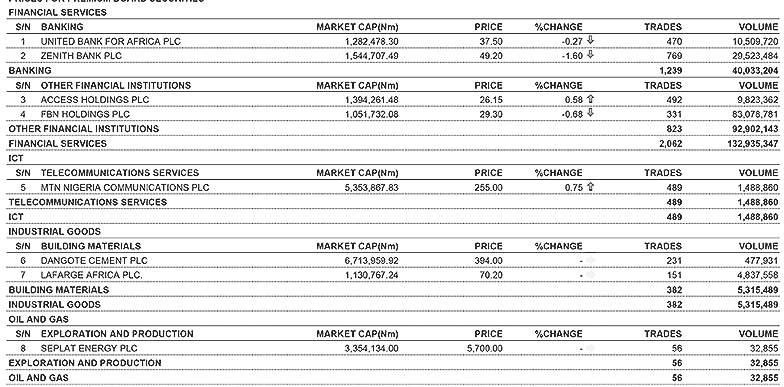
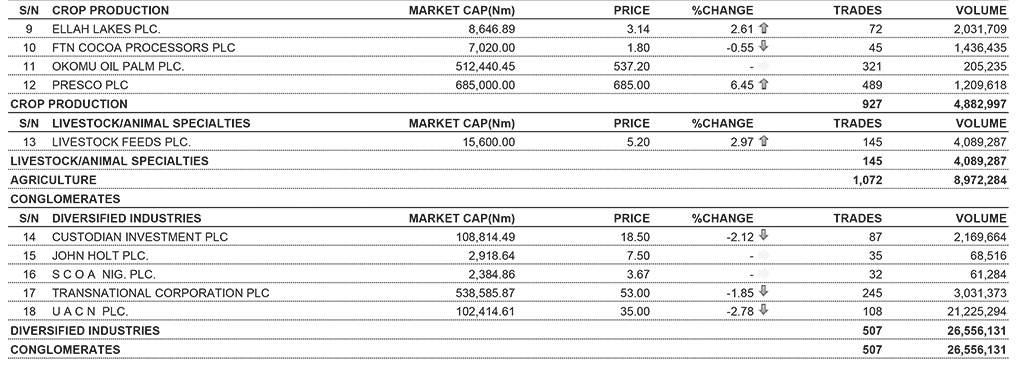



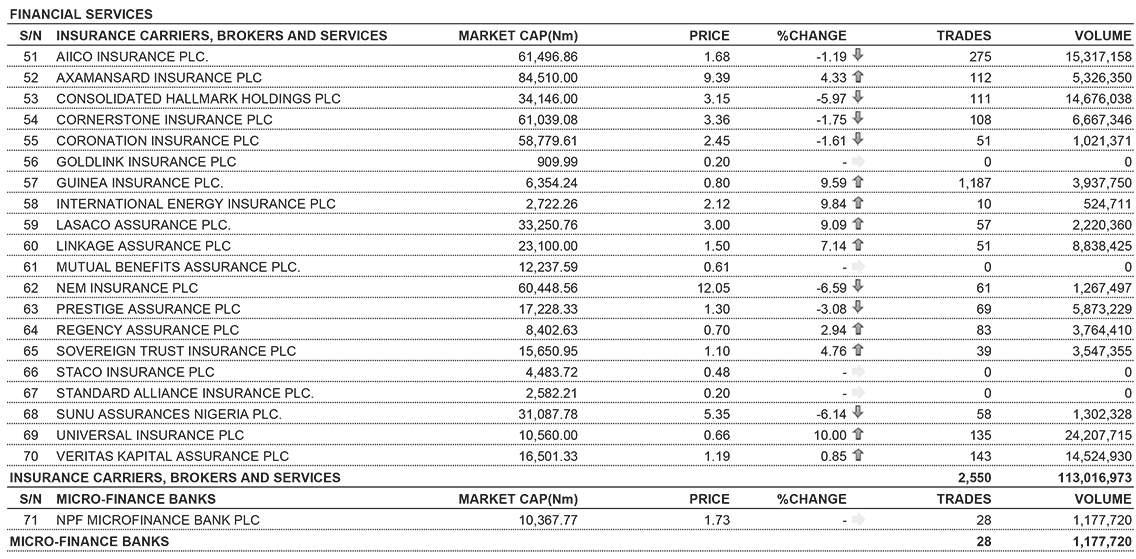

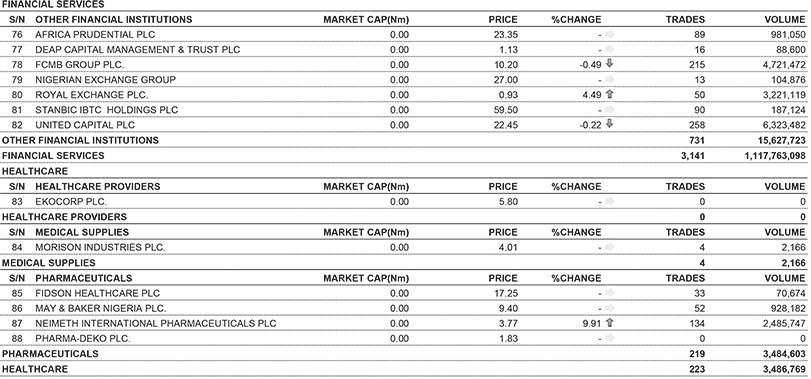
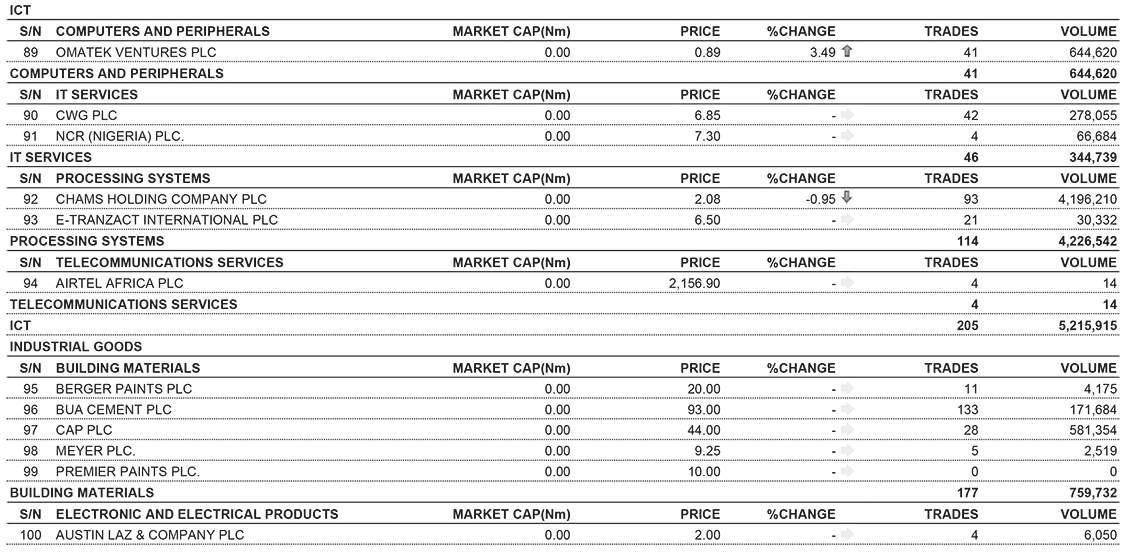
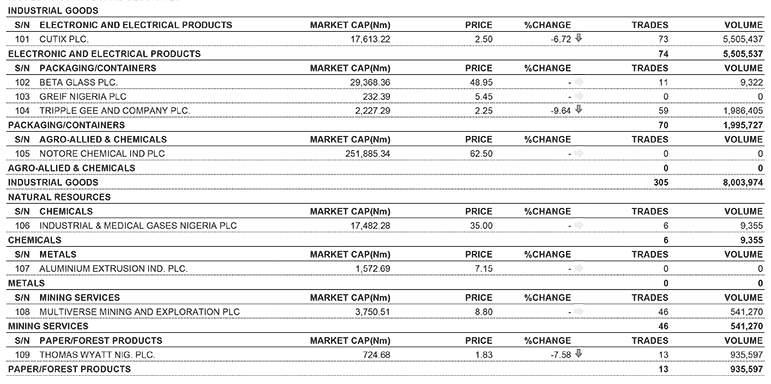
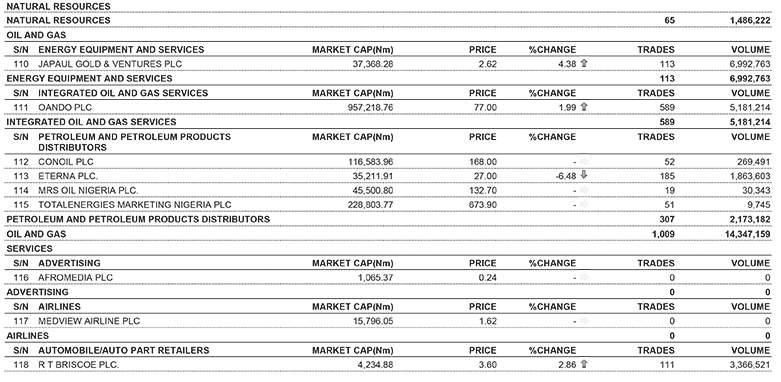
Folakemi Oloye is the dynamic force propelling Nigeria's art scene to unprecedented heights. As the founder of The Lagos Art Salon and Teal Harmony, parent company of Teal Culture, she has been instrumental in showcasing the country's rich artistic talent. She reflects on her latest endeavour, The Lagos Art Salon 2024, a 5-day exhibition that brought art enthusiasts, collectors, and creatives together to celebrate the best of Nigerian art under the theme "Art Unmasked." The insights she shared offered a compelling glimpse into the event's enduring legacy, as well as her vision, passion, and insights on the art world, providing a fascinating look into the mind of the driving force behind Nigeria's thriving art scene, in this interview with MARY NNAH
How did you get involved in Art?
Iam an interior designer. I've worked in the interior design sector for about 10 years now. We opened Teal Culture, a retail store that caters to the residential designs and residential projects sector. For instance, if you want to buy your furniture for your home, we’re your plug. In addition to other majorly residential-oriented projects.
I've always loved art. I remember when I was younger, I would go to the Louvre, and when I was there, my heart would be giddy. I would just dance around and just see everything and just be amazed at the minds of the people who come up with this beautiful body of work. And what do they think about it? What influenced it? What could have driven all of those emotions that they are projecting back into something that all of us can experience? So, it's just something that I've always really, really, really loved. But one of the things I found out about it as well was that a lot of times when you go to the galleries, works are portrayed beautifully, very nice. But what happens as well is sometimes it's difficult to see how they can feel in your home or in your space or in your office.
And so, we wanted to bring art in a way that was relatable where you could see it and picture it and say, you know what? I can carry this exact same artwork, in the exact same way, and I have a space and a wall that it will fit. And that's what the Lagos Art Salon is. We want to make art relatable where we remove anything that makes you feel like, “oh, it's just to be appreciated in a gallery and not in your private spaces.” We are on a mission to make art not just something to be admired, but something relatable that can be incorporated into homes and other non-gallery spaces. Everybody is deserving of something that is good. And so, that's what we are doing. We are trying to create that bridge.
What inspired you to start Teal Culture? What was the mission of this organisation?
So, what inspired me to start Teal Culture was, as an interior designer, you go around, you are looking for pieces and, you know, different styles. First and foremost, the market didn't frequently have as much versatile style as you would expect.
And we had a lot of people that were, you know, younger, people that are mid-executives. They're starting out, and, they've come into their own. They have their style.
And the style that was available wasn't necessarily fitting them. So, there was that. And there was also the issue of sometimes you get those pieces, but you have to buy them as a complete set.
And sometimes you only want one piece or you just want two pieces. And we faced that frustration shopping for clients, trying to put their things in the home. So, we decided that, you know what, let's do something different. Let's do something where it allows people more flexibility. For instance, if it's just one item you want, you can have it. You don't need to buy a full set. And pretty much that's what drove that. Giving people the opportunity to choose.
Tell us more about the Lagos Art Salon and the concept behind it
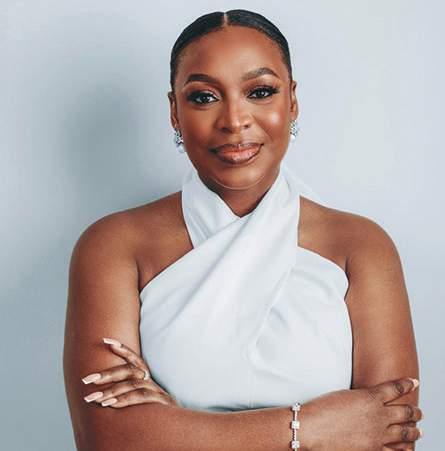
The Lagos Art Salon is what I would say is sort of like a bridge between artists and galleries where we show people art in a way they can consume it. And not just look at it and, you know, look at it and say, okay, this is beautiful.
Or look at it and just say, oh, that's stunning. But a way that they themselves can feel like they can own a piece. So, pretty much that's what the Lagos Art Salon is.
And we call it a salon because the idea behind it is that it's easy. It gives people that space that allows you to ask questions. And you don't feel like if I don't know about it, then maybe I look like a novice. In this place, everybody is a novice and everybody is an enthusiast. So, for you to be here, you must like art, you must enjoy it. And that's what we are catering for.
What informed the theme of Art Unmasked?
We asked ourselves, “How do we take off the layers? How do we take off biases? Misconceptions? We want to bring art in a way where you feel it, you can consume it, you can put it in your space. And it doesn't just feel like maybe it belongs to an unattainable set of people or it belongs to a different crowd. We are on a mission to democratize art. Art is beautiful, we all should have a piece of it and that's what it is. We are just taking off layers and removing anything that may be a hindrance to people wanting to have it.
What were some of the highlights that visitors experienced during the five-day event?
One of the key highlights was the
educational component, particularly for those interested in starting their art collection. We recognized that many people are unsure where to begin, so we provided entry-level guidance on how to appreciate, curate, and even view art as a valuable investment. The atmosphere was warm and welcoming, encouraging visitors to ask questions and feel at ease. We were happy to help them understand exactly what they were experiencing. Our goal was to create a space where people could truly enjoy the beautifully curated works on display, and take their time to really appreciate the art.
Can you talk a little bit about art investment and that culture?
One of the things that we have done here is, we have curated art that we know that you can invest in. One of the things people don't realise is that art is such a fantastic way to invest.
It's a good store of value. When you think about art, a lot of times you buy, for example, you buy furniture. The minute that furniture leaves this place, the price has gone down.
You buy a car, you can't use it anymore. But with art, you put it on your wall, it's functioning. But as it's functioning in your space and decorating it and making it look alive, and you're enjoying all the beauty of it, it's also going up in value.
So that's one of the things I find that a lot of people are not aware of. Sometimes they just see it as a decorative element and not realize that it is something for them to actually put together. In actual fact, from the last art salon we did and this one, we have some people's works that have already increased in price.
And that was just a couple of months ago. Art is definitely something that
a lot of us should begin to look at as a way to invest.
How did you curate the artwork for this show? What were the criteria for choosing the artists?
For this show, we have resident artists and then we have our new exhibitors.
For us, what is important is that we have a diverse collection that is able to appeal tp multiple people in different age ranges, and from different backgrounds.
And for us, what we did was to say, first you need to be a professional artist. It must be that this is not just a hobby, it must be that this is the work that you do.
These are also people that I have studied over the years, and seen their work evolve. We also did a lot of research on the people who we were going to be working with for this show. And in doing that, what we did was carefully curating and selecting upcoming artists, people that we felt like needed to have that visibility. People we felt we needed to push, because their work is really beautiful.
And we thought that it would be a good way, especially for people that also want to test the market. So we had upcoming artists, and we had seasoned artists as well. And so what have done is exhibit a multiple cadre of works.
And then in different styles, different techniques, just making sure that we create a varied group that people can really enjoy and will speak to people of different age groups and classes.
So what makes Art Unmasked an immersive experience? And how do you hope that it will inspire participants to interact with the art?
It's immersive because when you think about the art and you think about the multimedia that you experience, we have in a variety of mediums including having it on rice paper, we have it on canvas, we have oil on canvas, we have acrylic on canvas, we have multi-mediums and you get to see sculptures from stone, from clay, you even get to see furniture that's been done in art form as well.
And it's immersive because we've brought together a different body of work in multiple places that allows you to just experience them in a way that you probably would not have experienced them before.
Because when you think about it, most times you either have like a group of works that are sort of like similar mediums, or maybe you have like sculpture and all of it is old sculpture, but what we've done is to curate all of them together in such a way where you can experience them and begin to develop your own style and what appeals to you.
What trend do you see in the Nigeria arts market and how do you think arts on maps will contribute to the conversation?
Did you say trend? Trends, yes. Well, so I'm not a trend person. I typically try to shy away from trends, I stay away from trends, because I realize that with trends, they come in and they come out and they phase out, they phase in and phase out. But what I would say is that the arts salon is contributing to giving people an experience that they usually would not get.

L-R: Deputy President of the Senate, Senator Barau Jubrin; Leader of the Senate, Senator Opeyemi Bamidele; Chief Whip of the Senate, Senator Tahir Munguno; Vice Chairman, Senate Committee on the Environment, Senator Ned Nwoko; Chairman, Senate Committee on Social Development Goals, Senator Danjuma; and Chairman, Senate Committee on South East Development Commission, Senator Orji Uzor Kalu, after Nwoko formally defected to the All Progressives Congress at the Senate Chambers, National Assembly Complex, Abuja ... yesterday
James Emejo in Abuja
The Nigeria Customs Service (NCS) yesterday restated its commitment to transparency, fair trade practices, and efficient revenue management, under the leadership of the Comptroller General of Customs (CGC), Mr. Bashir Adeniyi.
The is as the service further said it recognises the invaluable contributions of stakeholders in shaping and actualising the Nigeria Customs Service Act (NCSA) 2023. It said the landmark legislation, which replaces the long-standing Customs and Excise Management
Act (CEMA) and other related laws remained a product of extensive consultations, constructive dialogue, and collaborative efforts with key industry players, government agencies, and other stakeholders.
In a statement, Assistant Comptroller of Customs National Public Relations Officer, Abdullahi Maiwada, the service acknowledged stakeholders' insights, expertise, and unwavering commitment had been instrumental in ensuring a robust legal framework that enhances efficiency, promotes innovation and strengthens transparency in customs operations.
Maiwada explained that in line with the provisions of Section 18 (1) of NCSA 2023, the NCS is implementing a 4 per cent charge on the Free On-Board (FOB) value of imports.
The FOB charge, which is calculated based on the value of imported goods, including cost of goods and transportation expenses incurred up to the port of loading, is essential to driving effective operation of the service, he noted.
Furthermore, he said the NCS acknowledges concerns raised by stakeholders over the sustained
collection of one per cent Comprehensive Import Supervision Scheme (CISS) fee (a regulatory charge imposed for funding Nigeria’s Destination Inspection Scheme) alongside the four per cent FOB charge.
The customs spokesman however, said as a responsive and responsible government agency, the service hoped to address all agitations raised by stakeholders over the charges, during extensive consultation which is ongoing with the Federal Ministry of Finance.
It therefore, urged all stakeholders to support tge legally binding
Michael Olugbode in Abuja
Nigeria is aiming at strengthening diplomatic ties with Kuwait with the Minister of Foreign Affairs, Ambassador Yusuf Tuggar arriving the Gulf nation for a landmark working visit.
The visit which runs from 5th to 8th February 2025, marks the first time a Nigerian Foreign Minister has visited Kuwait since the establishment of diplomatic relations on 31st January 1970 - 55 years ago.
According to a statement yesterday by the minister’s spokesman, Alkasim AbdulKadir, during the visit Tuggar
will engage in strategic discussions with his Kuwaiti counterpart, H.E. Ambassador Abdullah Ali Al-Yahya, and sign key bilateral agreements and Memoranda of Understanding (MoUs).
The visit will also include highlevel meetings with His Highness Sheikh Ahmed Al-Abdullah Al-Ahmad Al-Sabah, the Prime Minister of Kuwait, and a courtesy call on His Highness Sheikh Mishal Al-Ahmad Al-Jaber Al-Sabah, the Amir of Kuwait.
Tuggar and his Kuwaiti counterpart will formalize several agreements
designed to deepen cooperation, including: Joint Commission for Cooperation: Establishing a framework for stronger bilateral ties; Bilateral Consultations MoU: Strengthening diplomatic engagements between both Foreign Ministries; Diplomatic Training Cooperation MoU aimed at enhancing capacity building and diplomatic expertise exchange.
The statement read: “Additionally, discussions will be held on advancing negotiations on economic, trade, investment, science and technology, and agricultural cooperation agreements.
“As part of the visit, Ambassador Tuggar will meet with Kuwait’s Minister of Petroleum, Tariq Suleiman Al-Roumi, and the Director-General of the Kuwait Fund for Arab Economic Development (KFAED), Waleed Al-Bahar.
“The Minister will also participate in a business lunch hosted by Kuwaiti authorities, attended by leading business figures and investors.
“This visit is expected to strengthen diplomatic, economic, and investment ties between Nigeria and Kuwait, opening new avenues for cooperation across multiple sectors.”
initiative, as the measures introduced in alignment with the NCSA 2023 reflects a balanced approach born out of extensive consultations with industry players, importers, and regulatory bodies.
Names Chidi Okpala executive director Azubike Emodi appointed Afriland Properties MD/CEO
Heirs Holdings yesterday announce further strategic leadership appointments, with Chidi Okpala becoming Executive Director – Payments, Group Integration & Strategy (PGIS).
Also, Azubike Emodi was appointed MD/CEO, Afriland Properties Plc. Emodi succeeds Uzo Oshogwe who had led the company as its founding MD/ CEO since 2013, and who recently was appointed CEO of Transcorp Hotels Plc.
Okpala, according to a statement yesterday, would oversee Heirs Holdings’ technology and healthcare business sectors and would also be responsible for driving synergies across the Group.
He would additionally direct the HH Group’s strategy in the payment space, as HH leverages its financial services heritage and
technology platform, to enter this rapidly evolving sector. Okpala brings over two decades of leadership experience spanning financial services, FinTech, telecommunications, and strategy consulting. His impressive career includes roles with global and African leading organisations, including Accenture, United Bank for Africa (UBA), and Bharti Airtel International.
He was the Founder and CEO of Airtel Mobile Commerce Holdings (Airtel Money Africa), where he spearheaded the launch of Airtel Money, now one of Africa’s largest digital mobile wallets with over 40 million customers in 14 countries. Before joining Heirs Holdings, Okpala co-founded and served as CEO of Asante Financial Services Group, a FinTech firm empowering over 520,000 MSMEs across Africa with innovative digital financial solutions.
Bassey Inyang in Calabar
The National Council on Climate Change secretariate (NCCC), and Environment Stakeholders in the Niger Delta Region have brainstormed, and urged that immediate be taken towards ensuring sustainable mangrove conservation and protection in Nigeria. The Hybrid Stakeholders on Mangrove Restoration, Conservation and Protection with the theme; 'Amplifying Nature-Based Climate Solutions" was held Tuesday in Calabar, the Cross River State Capital, in collaboration with the Nigeria Conservation Foundation (NCF) and the Climate Change Council Cross Rivers State.
They highlighted the need of safeguarding the Nigeria Mangrove Forest that is occupying 10,500-kilometer square, which is already threatened by illegal man-made activities particularly in the Niger Delta Region. Speaking at the opening session of the meeting, the Director General /CEO of NCCCS and Special Presidential Envoy on Climate Change (SPEC), Dr. Nkiruka Maduekwe, said the Nigeria's mangrove forest is indicated as the largest in Africa and third largest in the world, covering approximately 5 percent of the global mangrove forest.
She said owing to the vitality of the coastal ecosystem in combating climate, and safeguarding commu-
nities from its effects, the NCCCS secretariat is developing a roadmap for the restoration of Nigeria’s essential mangrove forest, a robust initiative targeted for 2025 to 2035.
Maduekwe said the Town Hall Meeting would provide a crucial platform for all relevant stakeholders to discuss the next steps in ensuring sustainable mangrove conservation and protection in Nigeria.
Her words: “As part of the World's Wetlands Day and further to the 2025 theme of Amplifying Nature-Based Climate Solutions, the NCCCS is convening this Stakeholder Town Hall Meeting in collaboration with the Nigeria Conservation Foundation and the Climate Change Council Cross
Rivers State.
“A key output from this meeting is the National Roadmap on Mangrove Restoration, Conservation, and Protection. This Roadmap is expected to align with the ongoing NDC 3.0 review and indicates clear avenues to drive finance for mangrove conservation and protection in Nigeria."
Maduekwe said the crucial role of sub-national governments in implementing policies, and ensuring effective on-ground interventions through their commitments cannot be overemphasized.
On the role of the federal government, and state governments in protecting and reclaiming the mangrove vegetation, Maduekwe
said: "In line with HE Mr. President's Renewed Hope Agenda, the National Council on Climate Change Secretariat, of which Mr. President is the Chairman of the Council, will continue to play its role as a coordinating and regulatory entity, ensuring that policies and financial mechanisms support long-term sustainability.
"Furthermore, this meeting should serve as a catalyst for mangrove-rich states to establish investment-grade forest carbon projects. As we deliberate, let us carefully consider the essential building blocks of forest finance.”
Maduekwe commended the efforts of Cross River State in adopting the Climate Change Act.
She said that the legislative framework positions the state to harness climate finance opportunities geared towards adaptation and ecosystem-hand solutions. The Cross River State Governor, Senator Bassey Otu, represented at the event by the Commissioner for Special Duties and Intergovernmental Affairs, Mr. Oden Ewa, said the state remained committed to the fight against climate change, and would work to restore the lost ecosystem. Otu said for decades, Cross River State has led in environmental conservation with over 53,000 hectares of degraded mangroves primed for restoration.

L-R: Dr. Maymunah Yusuf Kadiri, CEO, Pinnacle Medical Service/Founder Howbodi; Dr. Omolola Salako, Founder/CEO Oncopadi; Dr. Adaorah Enyi, COO Oncopadi; Engr. Oluwaseyi Valentine Buraimoh, Chairman, Amuwo Odofin LG; Adedayo Oketola, President, International Visitor Leadership Program Alumni Association (IVLPAA); Hon Olusegun Idris, Chief of Staff to Amuwo Odofin LG Chairman; and Princess Adetoun Tade, immediate past President of IVLPAA during the 2025 World Cancer Day Awareness Seminar organised by the IVLPAA in partnership with Amuwo Odofin LG and Oncopadi at Amuwo Odofin LG in Lagos, on Tuesday
The Senate in plenary yesterday approved the termination of the appointment of three resident electoral commissioners earlier suspended by the federal government.
The red chamber took the decision following a motion by the Senate Leader, Opeyemi Bamidele, sequel to a letter from President Bola Tinubu seeking the sacking of the suspended RECs.
Tinubu, had in his letter, read on the floor of the upper chamber, requested the federal lawmakers to consider termination of the appointment of the three RECs.
The Senate in taking the decision, invoked Section 157 of the Constitution of the Federal Republic of Nigeria 1999, as amended to enable them terminate the appointment of the electoral officers.
Part of the motion read: “Aware of an Executive Communication from Mr. President and Commander-In-Chief of the Armed Forces of the Federation, requesting the Senate to invoke Section 157 (1) of the Constitution of the Federal Republic of Nigeria 1999, as amended, to formally terminate the appointments of Dr. Nura Ali (Sokoto State Resident Electoral Commissioner); Barr. Hudu Yunusa Ari (Adamawa State Resident Electoral Commissioner) and Prof. Ikemefuna Chijioke Uzochukwu (Abia State Resident Electoral Commissioner), respectively.
“Also, aware that the aforementioned Resident Electoral Commissioners were earlier suspended in 2023, bordering on allegations of infractions of Electoral Act; compromise of
elections and abandonment of duty without cogent reason.
“Notes from security reports from the Office of the National Security Adviser and the Department of State Services that Dr. Nura Ali was indicted for compromising the 2023 Presidential and National Assembly election.
“They did this through acts of incompetence and corruption, whereby he (Ali) reportedly confessed to having received the sum of $150,000 from politicians upon investigation by the DSS.
“Barrister Hudu Yunusa Ari was suspended by former President Muhammadu Buhari, after a prima facie case was instituted against him for usurping the power at the Returning Officer to declare the governorship election result.
“Prof. Ikemefuna Chijioke Uzochukwu way suspended for undermining election processes by mishandling of logistics and abandonment of governorship and State Assembly elections and refusal to reschedule supplementary elections.
“The Senate is aware that by virtue of the provisions of section 157 (1) of the Constitution of the Federal Republic of Nigeria 1999, as amended. The Section stipulates that: “a person holding any of the offices to which this section applies may only be removed from that office by the President acting on an address supported by two-thirds majority of the Senate.
“The Senate should be praying that he be so removed for inability to discharge the functions of the office (whether arising from infirmity of mind or body or any other cause) or for misconduct.
“The Senate is empowered to embark on this legislative process, which is aimed at setting the stage for the eventual removal of the suspended Resident Electoral Commissioners.
“The Senate is also aware that the Independent National Electoral Commission is one of the offices mentioned in Subsection (2) of the
aforementioned provision of the Constitution.
“Accordingly, it is apt for the Senate to invoke and activate the provision of Section 157 (1) of the Constitution to remove the suspended Resident Electoral Commissioners in line with the resolve of the two-thirds Senate to uphold the rule of law and sustain
the ideals of morality and the tenets of corporate governance in Nigeria.”
The Senate therefore resolved to invoke and activate the constitutional provision as enshrined in section 157 (1) of the constitution as amended, by forwarding its resolution to Tinubu to act upon.
The red chamber by voice vote, subsequently approved the
respectively.
Faith-based Civil Society Organization, CSO, Independent Hajj Reporters, IHR, has urged the Central Bank of Nigeria (CBN) to exclude Hajj 2025 intending pilgrims from the new policy of payment of Basic Travel Allowance (BTA) of via ATM Cards.
IHR which reports, monitors and advocates workable Hajj policies in Nigeria, in a statement Wednesday by its national coordinator Ibrahim Muhammad said the policy will create unprecedented hardship and confusion in the hajj eco system in Nigeria.
The CSO was at the forefront of the same campaign against the use of ATM cards to pay pilgrims their BTA during last year’s Hajj pilgrimage.
“We advise CBN to exclude Hajj pilgrims from this policy because of the foreseen hardship to be faced by our dollar pilgrims while in Saudi Arabia,” it said, in a statement.
Before commencement of the 2024 Hajj airlift, the apex bank had informed the National Hajj Commission of Nigeria (NAHCON), states and the armed forces that the payment of the year’s Hajj BTA, pegged at $500 per pilgrim, would be issued in the ratio of 60/40% cash and card.
The bank said only $200 will be given in cash while the balance of $300 will be given in cards.
The decision generated a lot of controversy because of the expected challenges to the use of cards by the average Nigerian pilgrims in Saudi Arabia.
IHR said it understands the CBN has promised to implement the policy during the forthcoming hajj exercise.
“Firstly, the majority of Nigerian pilgrims are from rural areas and most of them are not versatile in the use of e-payment systems.
“They can easily enter the wrong pin 3 times and the cards will be
blocked while in Makkah or Madina, in Saudi Arabia.
“Who will reactivate the cards for them at a time when all focus is on how to carry out hajj rites diligently to attain the utmost reward of hajj mabrur?” the IHR asked.
Secondly, the CSO said there are less than 10 ATM machines within Misfala and Shara Mansur areas in Makkah - a place where 90 percent of Nigerian pilgrims are accommodated during Hajj.
IHR said that pilgrims will be made to pay for the ATM Cards and the withdrawal charges which
will further deplete their $500 BTA. There is also the risk of losing the ATM cards, theft and scammers capitalizing on the hectic nature of the hajj exercise to defraud the pilgrims. IHR added that with Nigeria on the grey list of the Financial Action Task Force (FATF), the tendency is for ATM cards issued by Nigeria to be rejected by a number of vendors outside the shores of the country. Given the above, IHR therefore appealed to the CBN to exclude Nigerian pilgrims from the BTA on card policy to avoid putting pilgrims in jeopardy.
The Federal Road Safety Corps (FRSC) Wednesday in Abuja said through the instrumentality of the National Vehicle Identification Scheme Portal (NVISP), the agency dealt a devastating blow to car thieves and other criminal elements operating in Nigeria, thereby recovered an unprecedented 73 stolen vehicles across the country in the year 2024 alone. This remarkable achievement, the FRSC disclosed is a testament to its relentless commitment to enhancing national security, strengthening intelligence gathering/sharing as well as
enhancing the safety of lives and properties of road users. The vehicles were recovered during coordinated intelligence-driven operations conducted by the FRSC in collaboration with other security agencies at the point of registration of the suspected vehicles.
The Corps Marshal, FRSC, Shehu Mohammed praised personnels for their exceptional bravery, professionalism, and dedication to duty. He stressed the corps will continue to work tirelessly to rid the nation of all elements through swift response and proactive measures to not only save innocent lives, but also protect
the economic interests of Nigerians.
He said: "The 73 stolen vehicles recovered are in the category of 4 Toyota Highlander, 1 Toyota Lexus, 21 Toyota Corolla, 17 Toyota Camry, 6 Toyota Sienna, 6 Lexus 350, 3 Lexus ES350, 1 Toyota Hilux, 1 Toyota RAV4, 1 Toyota Celica, 1 Toyota Venza, 1 Suzuki Bus, 1 Honda Pilot, 1 Honda Ace, 2 Honda Accord, 1 Daihatsu, 1 M/Benz Car, 1 Man Truck, 1 Pontiac Vibe and 2 Qlink Motorcycle." In this light, he admonished vehicle owners to always ensure that they provide all necessary information required of them at the point of registration of their vehicles.
This is because adequate information helps in intelligence gathering which in turn, makes timely recovery of vehicles possible. He also stated that the corps will not relent in its efforts to make Nigerian roads safe and secure for all users as he urged members of the public to continue to support the corps in this quest for safer roads in Nigeria. His words: "As the FRSC continues to push the boundaries of excellence in road safety management and crash prevention, Nigerians are assured of a safer and more secured motoring environment."
Adibe
The Edo State Assets Verification Committee yesterday asked Governor Monday Okpebholo to review and reevaluate all agreements, memorandums of understanding (MoUs), leases and tenancy entered into by the administration of Godwin Obaseki.
The committee made the call in its final report which was presented to the governor in Government House, Benin City.
The chairman of the committee, Dr. Ernest Afolabi Umakhihe, while presenting the report, noted that certain agreements may have been executed in ways that do not align with the best interest of the state.
According to him, the committee recommended that the state government should take immediate steps to review all ongoing and past contracts to ensure that they are both fair and advantageous to the people of Edo State.
Umakhihe, who said the committee unraveled potential fraud,
mismanagement, and corruption in the governance of the State by the immediate past government, recommended that immediate steps be taken to investigate the findings. He said the investigation would ensure that culprits are prosecuted where necessary, noting that bringing those responsible and found culpable for wrongdoing to justice would send a clear message that Edo State was committed to upholding the highest standards of integrity and accountability in governance.
"The committee did not only submit the final report or merely delivering a document, but the findings and recommendations of a meticulous process, aimed at enhancing and protecting the future of our beloved state.
“Our task has not been without challenges, but the committee was driven by the need to provide Edo State Government with a clear and accurate picture of its financial status as well as the state of its assets and liabilities.
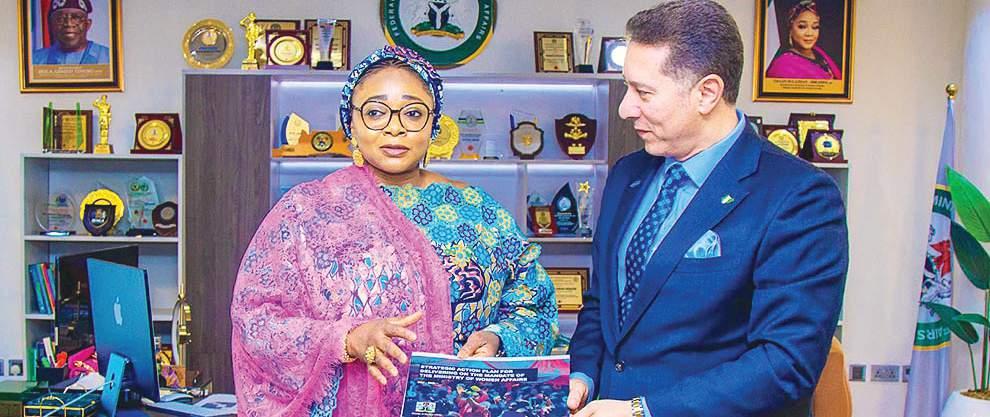
Honourable Minister of Women Affairs, Hajiya Imaan Sulaiman-Ibrahim (left), presenting the ministry's Strategic Action Plan to the Chief Executive Officer and Vice President of Fakeeh Health, UAE and Kingdom of Saudi Arabia, Dr Mohaymen Abdelghany, during visit by Fakeeh Health team to the minister in Abuja…recently
Former President Olusegun Obasanjo, the Sultan of Sokoto, Alhaji Sa'ad Abubakar and the President, Christian Association of Nigeria (CAN), Most Rev. Daniel Okoh, yesterday, called for religious tolerance among Nigerians to have one united country.
This was as a former Speaker of House of Representatives, Hon. Yakubu Dogara, has declared that religious intolerance, among other challenges facing the country, was a product of bad leadership.
Obasanjo and others spoke in Ibadan at the World Interfaith Harmony Week Conference and Award ceremony organised by a radio station, Honour 103.5 FM and Pan-af Publishers, in collaboration with the United Nations, with the
theme:"The Love of the Good and The Love of the Neighbors."
Also present at the event were former governor of Ogun State and Senator representing Ogun East, Otunba Gbenga Daniel; former CAN President, Rev. Supo Ayokunle; President, National Baptist Convention (NBC), Rev. Israel Akanji; and veteran broadcaster, Dr. Yemi Farounbi.
Obasanjo, while presenting a thematic remark, said all religions preach true love and tolerance as there could not be peace without true love, stating that it was the collective responsibility of all Nigerians for the country to be in peace which should not be left alone for the other person.
In his remarks, the Sultan of Sokoto, who was represented by the President, Muslim Ummah of
South West Nigeria (MUSWEN), Alhaji Rasaki Oladejo, said if Nigerians couldcome together as one despite their differences, “we can have a better society because most of problems the nation are having have to do with lack of understanding particularly,when it comes to religion and ethnicity.”
Describing the gathering as a clarion call on all Nigerians to have tolerance, love each other and stand with themselves, he urged all Nigerians to forget any contradiction on religion and embrace peace and love which all religion preach.
The CAN President, Most Rev. Okoh, on his part, said the event was timely and a critical reminder for all Nigerians to embrace love, compassion and mutual respect for each other, charging Nigerians to
work collectively towards building a future where peace and harmony reign and all could live together in peace and unity.
Dogara, in his keynote address delivered by Hon. Timothy Golu, said both Islam and Christianity pride themselves as religions of peace with the scriptures commanding that one must live peaceably with all men.
Lamenting that this has become so difficult in the country, he maintained that Nigeria was where it was today because of lack of leadership and denial of personal responsibility which has become a moral epidemic today.
According to him, Nigerians owed it to themselves and their children’s posterity to strive for peace, noting that all Nigerians should deploy skills and humanity to create a society
The Nigeria Police Force has withdrawn the alleged fraud charge against Mr. Gbolahan Obanikoro, the son of Senator Musiliu Obanikoro, and four others, over alleged N1.3 billion fraud involving Access Bank.
Gbolahan alongside, Adejare Adegbenro; Balmoral International Limited; M.O.B. Integrated Limited; and DDSS International Company Limited were billed for arraignment before Justice Ambrose Lewis-Allagoa of the Federal High Court in Lagos on February 27. However, the police in a Notice of Withdrawal brought under Section 108(1) of the Administration of Criminal Justice Act, 2015, has informed the court of its desire to withdraw the charge against the defendants.
The document dated February 4, and signed by a Chief Superintendent of Police, J. I. Enang read in part: "Take notice that the prosecution hereby withdraws the above mentioned charge against the defendants herein.
However, no reason was given for the withdrawal of the charge.
In the suit marked: FHC/ L/902c/2024, the defendants were accused of conspiracy, obtaining by false pretences, and involvement in a N1,356,057,330.43 fraud.
The Inspector General of Police, had through the Special Fraud Unit (PSFU) in Ikoyi, Lagos, accused all the defendants of conspiring between May and September 2013 to fraudulently obtain the sum of N1,356,057,330.43
from Access Bank Plc (formerly Diamond Bank).
They allegedly misrepresented themselves to the bank’s staff and officers, claiming that they were involved in the business of importing cars from Dubai for sale in Nigeria and that the money was needed to finance the importation of a set of brand-new cars for resale.
The defendants were also accused of converting, transferring, retaining, or taking possession of the funds, knowing or having reason to know that such funds were proceeds of
unlawful activity.
Additionally, they were alleged to have unlawfully converted the sum of N1 billion belonging to the bank for personal use.
When the matter came up last month, the prosecutor, M.Y. Bello informed the court that the matter was scheduled for the arraignment of all defendants.
However, he requested a new date to allow all the defendants to appear in court and take their pleas.
Counsel for the 4th defendant, Joshua Abel, told the court that most
of the defendants, who were directors were not in the country, adding that only the companies named in the charge had been served with the charge sheet.
He, however, assured the court that all defendants would be present at the next adjourned date to take their pleas.
In light of the submissions, Justice Lewis-Allagoa adjourned the matter to February 27 for the arraignment of all the defendants.
Meanwhile, there were indications that the hearing for the case to be struck out might hold tomorrow, Friday.
where every individual could live with dignity, pride, respect and with abounding peace.
He said, "Leaders think and talk about solutions and responsibility is at the heart of leadership because the leader is the one who responds to a need.
“That response may be to God's call or to the needs they see around
them, in this case, the unmitigated violence we witness on daily basis. It is said that, ‘everything rises and falls on leadership. "No society throughout history has ever risen above the level of its leadership. Sadly, when we abdicate our responsibility, all we have left is to cover up our weakness as in the case with us now.”
The University of Lagos Alumni Association, FCT Branch, has announced the constitution of new executives that will run the affairs of the association in the chapter for the next two years of 2025-2027.
In a statement by its Publicity Secretary, Tola Ogunnubi, ANIPR, yesterday, the branch said inaugurating the new executive members after the elections that was held on January 23, 2025 in Abuja, the Chairman of the Branch Electoral Committee (BEC), High Chief Niyi Akinsiju, announced Dr. Emmanuel Chibuzo Ibe, FNIM, as the winner of a keenly contested election with Mr. Edward Adebanjo, FNIPR, Dr. Emmanuel Ibe was returned as the new Chairman of the branch.
The statement said: “Dr. Emmanuel Ibe returns for a two-year term of office in the first instance. While Mrs. Julia Davis is the new Vice Chairperson.
Engr. Ayoade Ajani is to oversee the secretariat as the Secretary General, while Ms. Chinyere Okafor is the
new treasurer and Princess (Mrs.) Felicia M. Tor-Anandeh is the Internal Auditor of the branch.
Mr. Gbade Inaolaji-Tella returns as the Financial Secretary for a second two-year final term while the immediate past Welfare Secretary, Mrs. Abiodun Ngozi Oseni, is now the Social Secretary of the chapter. Mr. Tola Ogunnubi, ANIPR, is returned for a second and final term as the Publicity Secretary, and Mrs. Mercy Kolawole is the Welfare Secretary.
Others are Barr. Chuks Akamadu who was the immediate past Social Secretary becomes the new Legal Adviser and the new Assistant Secretary General is Mr. Levi Ikechukwu.
In his acceptance speech, Dr. Emmanuel Ibe promised on behalf of the newly inaugurated executives to continue the good works already started by his predecessor in office, ensure the unity of the branch and improve on welfare concerns of members.
David-Chyddy Eleke in Awka
The United Nations Children's Fund (UNICEF) has decried the prevalence rate of female genital mutilation and cutting (FGM/C) in the South East, calling for more efforts to stem the tide.
Chief of UNICEF Field Office in Enugu, Mrs. Juliet Chiluwe, stated this during a zonal media dialogue with journalists, media executives, and civil society organisations in commemoration of 2025 international day of zero tolerance for female genital mutilation, held in Enugu, yesterday. She said: "The practice of FGM/C
is rooted in gender inequality and power imbalances between men and women - and it sustains them by limiting opportunities for girls and women to realize their rights and full potential in terms of health, education, income, and equality.
"Female genital mutilation violates the fundamental rights of girls. It comprises all procedures that involve altering or injuring the female genitalia for non-medical reasons and is recognized internationally as a violation of the human rights, the health and the integrity of girls and women.
"It violates fundamental human rights such as the right to health, life,
physical and mental integrity and freedom from torture, and can result in complications from detrimental physical and psychological as well as social and economic impacts lasting throughout childhood, reproductive years, and old age.
"It is a form of gender-based violence, a harmful practice against women and girls, and a public health challenge. It is often undertaken as a traditional rite of passage aimed at limiting sexual enjoyment and ‘protecting female chastity’.
"We still have unacceptable prevalence rates across the Southeast states, with Imo State ranking first at 38% prevalence among women
age 15-49 years and 9.7% prevalence among girls age 0-14 years.
"Similarly, prevalence among women age 15-49 years in Ebonyi, Abia, Enugu and Anambra states stand at 20.4%, 20.3%, 19% and 13.1% respectively. For girls aged 0-14 years, prevalence stands at 3.7%, 3.0%, 2.1% and 0.2% respectively for Enugu, Abia, Anambra and Ebonyi states."
Earlier, a public health consultant and lead resource person at the zonal dialogue, Dr Chikezie Obasi, while speaking on the theme: ‘Stepping Up the Pace: Strengthening Alliances and Building Movements To End FGM', called for collaboration among media practitioners to end the practice.
He said: "According to UNICEF 2024, Nigeria has the highest number of FGM survivors in the world with 19.9million women affected. Over 230million girls and women worldwide have undergone FGM/C. It is also estimated that $1.4billion is expended annually on management of complications arising from it."
He listed some FGM/C practices to include clitoridectomy, excision, infibulation and piercing of the clitoris, which he said has become a sort of fashion for some young women. He also listed the consequences to include; bleeding, infection, shock, urination difficulty among others.

L-R: Prof Tomola Obamuyi, co-author of the book, Mr Ralph Osayameh, Chairman, Body of Past Presidents,
Okenwa, book reviewer and Founder/ProChancellor, Lux Mundi University, Umuahia, at the launch of the book Financial
Institute of
Former Kaduna State governor, Malam Nasir El-Rufai, has waded into the war of words between the National Security Adviser, Malam Nuhu Ribadu, and a former Commissioner at the Police Service Commission (PSC), Hajia Naja’atu Muhammad, saying Ribadu might be suffering a memory loss.
Ribadu had demanded a public apology and retraction from Muhammad, whom he accused of lying against him in a Tik Tok video.
In the Tiktok video, Hajia Muhammad, accused the NSA of serving in President Bola Tinubu’s government, whom he had castigated when he was the Chairman of the Economic and Financial Crimes Commission (EFCC).
But in a letter through his lawyer, Dr Ahmed Raji, SAN, the NSA said publicly or privately, he had never maintained such viewpoint, adding that the damage that had been done as a result of the Tiktok video was unquantifiable.
“Clearly, in the text of your recording (reproduced and translated above) you stated that when our client served as the Chairman of the Economic and Financial Crimes(EFCC), he allegedly named President Bola Ahmed Tinubu, GCFR, alongside Sen. George Akume and Sen. Orji Uzor Kalu (all former Governors, and in that order) as the governors in Nigeria who stole the
most from public treasury.
“You also stated that today, our client who once held the above odious view about President Tinubu has turned around to be his staunchest defender, especially, with regards to what you stated to be the government’s agenda to silence voices of dissent to the government, citing the alleged arrest of a certain Prof. Usman Yusuf as an example.
“You also stated that our client’s alleged attitudinal change towards President Tinubu means that he has either become a liar or that he lied when he allegedly described President Tinubu, Sen. Akume, Sen. Kalu and other governors as thieves,” read the letter dated February 4, 2025, and signed by Dr. Raji.
Maintaining her stance, Muhammad said she had no reason to tender any apology as the records were there.
El-Rufai, however, defended Muhammad, taunting Ribadu by saying, “Nuhu must have serious amnesia.
“The record of proceedings in the Senate will confirm that Nuhu made those statements, sometime in 2006. The subsequent Daily Trust report below of February 2007, reconfirms the essence of the statements.
“The conclusions of the Federal Executive Council in 2006, which can be subpoenaed from the Cabinet Secretariat of the SGF’s office contain the allegations.
“In that Special FEC meeting in which I was a member, Nuhu’s EFCC
The new Commissioner of Police, Edo State, Betty Otimenyin has said under her leadership, issues relating to rape and defilement would not be swept under the carpet and promised to ensure that the department of the police handling such cases give justice to all victims.
She also called on the people of the state to cooperate with the Police Force to check cases of violent crimes like kidnapping, farmers herders’ clashes, cultism and others by making information available to the police all the time.
She said with the new law on cultism and kidnapping in the state, withholding information from the police could be counter-productive.
Otimeyin stated this at the Edo State Council Secretariat of the Nigeria Union of Journalists (NUJ) when she paid a courtesy call on the union and interaction with journalists.
According to the CP, who was received by the leadership of the Union led by the chairman, Festus Alenkhe, “If the person is not just being animalistic, what will attract a child to an adult?
“You have a child at home, you have a baby at home, what are you seeing, what will somebody be seeing in a child if he is not having psychiatric issues?
“What amazes me is that some people come as a body and they will be protecting not the victims but the violators and one begins to imagine where they once violators themselves? Is that why they are protecting their kind?
“Because a sane human being will not protect a violator but rather the victim. Will such persons be happy if their child is violated in that manner?
“Or are they saying that they can allow their own daughters to be defiled, or you allow your own wife to be raped? We will continue to work on this because I have sympathy for victims.”
made similar presentations accusing many sitting officials, sometime in 2006. These Council Conclusions will further remove all doubts.
“This is for the record and to remind the morally-flexible that at some point in our national life, silence is no longer golden.” the former governor of Kaduna State stated.
Meanwhile, a former senator, who represented Kaduna Central Senatorial District, Shehu Sani, has lashed out at El-Rufai, asking him to account for the $350 million loan he collected from the World Bank while serving as governor.
Sani was reacting to El-Rufai’s attack on his successor, Governor Uba Sani.
El-Rufai had Tuesday accused Sani of sycophancy and for supporting President Bola Tinubu for personal gains.
bold vision for making Nigeria self-sufficient in several key sectors.
“The NESG is grateful, and I believe the nation is as well. This refinery represents the audacity of courage. It takes immense effort to do what you’ve done and still be standing and smiling. Thank you for inspiring us and showing that nothing is impossible.
“You’ve transformed Nigeria from a net importer of petroleum products to a net exporter. We’ve all read ‘Think Big’, but this is truly about thinking big. The message is clear: the private sector can bring about real change,” he added.
Yusuf, alongside NESG board members and stakeholders, toured the refinery and fertiliser plants, lauding the level of investment, technology, and sophistication of young Nigerian engineers running world-class laboratories and central control units.
The plaintiff had dragged the Nigerian Midstream and Downstream Petroleum Regulatory Authority (NMDPRA) and six others to court over the issuance of licenses for the importation of petroleum products.
While NMDPRA is the 1st defendant, the NNPC, AYM Shafa Limited, A. A. Rano Limited, T. Time Petroleum Limited, 2015 Petroleum Limited, and Matrix Petroleum Services Limited are 2nd to 7th defendants, respectively, in the originating summons, marked: FHC/ABJ/CS/1324/2024 dated September 6, 2024.
At yesterday's proceedings, Mr. Abimbola Ademola (SAN), who moved the motion on behalf of the NNPC, urged the court to either strike out the suit for lack of jurisdiction or, in the alternative, strike out the name of NNPC from the suit.
Responding, plaintiff's lawyer,
The governor had in an interview with TVC news on Monday expressed suprise over increasing criticism of the Tinubu administration by some founding members of the ruling All Progressives Congress (APC), including some former governors, who left office less than two years ago.
Reacting to the governor’s comments on his verified X handle, El-Rufai alleged that Sani’s staunch support for Tinubu was because of the N150 billion reimbursements to Kaduna by the federal government in the past 18 months.
Also reacting to El-Rufai’s attack on his Facebook page, Senator Sani said nobody in Kaduna State could confidently claim they knew the $350 million World Bank loans given to the state was spent.
"The ex-governor of Kaduna State accused the present governor of col-
Mr. George Ibrahim (SAN), urged the court to dismiss the preliminary objection by NNPC for being unnecessary. Ibrahim also prayed the court to allow the plaintiff's application seeking to amend its suit.
After parties adopted their written submissions on the issues, the trial Judge, Justice Inyang Ekwo adjourned till March 18, 2025 for ruling.
Dangote Refinery in its suit is praying the court to nullify import licences issued by NMDPRA to the NNPC and the five other companies for the purpose of importing refined petroleum products.
Oando offers shareholders additional stocks valued at N97.6bn
Meanwhile, Oando Plc, Nigeria's leading integrated oil and gas company and the country's first International Oil Company (IOC), yesterday said it was rewarding its shareholders by offering them 1.28 billion additional shares in the form of stock dividend valued at N97.6 billion.
This is coming days after the Wale Tinubu-led company announced a record N4.1 trillion revenue for the year 2024 unaudited financial result, about 45 per cent growth from N2.9 trillion reported in 2023 and N65.5 billion in profit after tax. This was about 9 per cent growth from N60.28 billion reported the previous year.
A statement from the organisation said that this means shareholders will get more shares added to their investment portfolio at no extra cost, noting that the sheer size of the offering, with 1.28 billion shares distributed, makes it the biggest shareholder reward in Oando's history.
This decision follows the approval
lecting ‘N150 billion’ from Tinubu and refusing to disclose it to the people of the state. Let's recall history and find the answers.
“The ex-governor collected millions of dollars in Paris tefund from Buhari and never disclosed it to the people of the state. He collected billions of excess crude funds from Buhari and never disclosed it to the Kaduna public.
“He collected billions in ecological funds from BUHARI and never disclosed it to the Kaduna people," he said, alleging further that, “He collected billions of special grants from Buhari through the CBN and never disclosed it to the Kaduna public.
“He collected stamp duties in billions from Buhari and never disclosed it to the people of the state. He collected billions from a commercial bank and mortgaged the state's IGR and never disclosed it to
of shareholders at the company's 45th Annual General Meeting (AGM) held on December 17, 2024, authorising that: "The company may cause shares received pursuant to sub-resolution (b) above, and/or their cash equivalent to be distributed to shareholders of record at date(s) as may be determined by the board of directors, from time to time, on a pro-rata basis."
Subsequently, Oando said the board of directors resolved to distribute the shares in two tranches at a meeting held on January 30, 2025.
“The total worth of shares valued at N97,562,157,676, based on Oando Plc closing share price of N76 as of January 30, 2025, will be distributed to its shareholders beginning with 641,856,301 ordinary shares at the close of business on February 14, 2025, and 641,856,300 ordinary shares at the close of business on June 30, 2025,” it added.
According to Oando, stock dividends are considered superior to cash dividends as shareholders are being given the choice of either keeping their return on investment or turning it to cash whenever they want, noting that with a cash dividend, that option is unavailable.
“In this instance Oando shareholders are getting a return on investment of over 10 per cent. The increase in shares also means an increase in potential future dividends, as the more shares a shareholder owns, the more dividends they can potentially receive.
“Furthermore, instead of paying cash, which could weaken the company’s future financial position, Oando is preserving value and ensuring shareholders benefit from future growth through this scheme. By distributing shares, the company can maintain a strong
the Kaduna people.
“There is nobody in Kaduna State, who can confidently hold his Holy Book and swear that he or she knows how every kobo of the Kaduna’s $350 million World Bank loans was spent, until the Kaduna Assembly probe.
“If the present governor actually refused to disclose the mythical ‘150 billion’, he must have learned it from the ex-governor. The ex-governor is coming to equity with dirty hands.
“If the present governor is supporting Tinubu because of money, can we say that the former one was supporting and kneeling down for Buhari for the same reason?
“The man with a body odour is accusing another of having a mouth odour. The ex-governor also accused the present governor of betrayal. It's simply a case of the legend of betrayal being outsmarted by the grand guru.”
financial position, which is crucial for future growth and investment opportunities,” it added.
This positive news for Oando shareholders directly increases minority shareholders' ownership stakes by one new ordinary share of 50 kobo each for every 12 existing ordinary shares of 50 kobo held by the shareholders without dilution, Oando stated.
The news comes in the wake of Oando’s robust performance in 2024, bolstered by its $783 million acquisition of Nigerian Agip Oil Company (NAOC) in August 2024, which led to a bullish increase of over 500 per cent in its share price.
“The acquisition also significantly impacted the company's full year 2024 financial results, resulting in a 45 per cent surge in revenue to N4.1 trillion. This strong financial performance should instill confidence in shareholders about the company's prospects,” Oando added.
Building on the track record of 2024, Oando said it earlier won the award of Block KON 13 in Angola’s Onshore Kwanza Basin in January 2025, saying that the future remains hopeful for shareholders.
This, it said, is made even clearer, with the Group Chief Executive, Wale Tinubu, mentioning in a recent statement that the company will prioritise cost optimisation, operational efficiency, streamlining processes, enhancing procurement, and leveraging technology to improve productivity across operations.
“This is just the first step in Oando's ongoing commitment to enhancing shareholder value. By distributing the shares in two phases, Oando ensures that its stock price remains strong and stable, avoiding any sudden market drops,” the statement added.
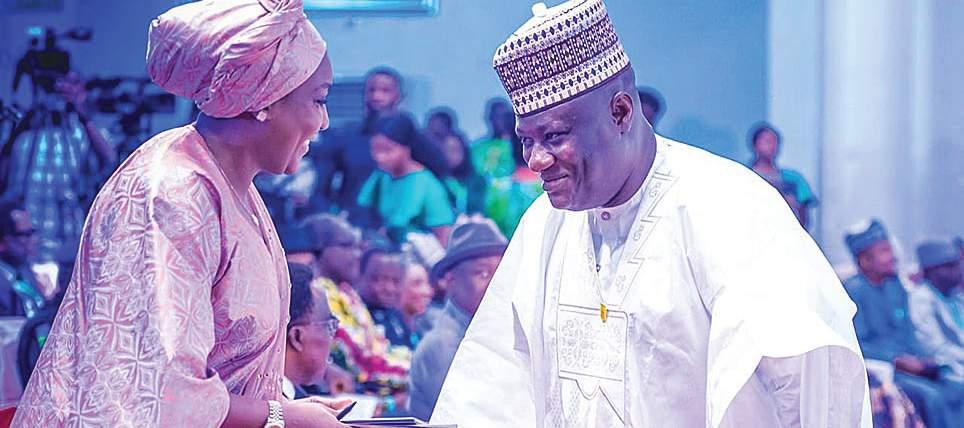
L-R: Director General, National Emergency Management Agency (NEMA), Mrs Zubaida Umar; and Permanent Secretary, Federal Ministry of Aviation and Aerospace Development, Dr.
during the unveiling of the 2025 Seasonal Climate Prediction by the Nigerian Meteorological Agency in Abuja on Tuesday
The Presidency, yesterday, disclosed that two of the three West African nations, who asked to leave the Economic Community of West African States (ECOWAS) after recent military takeovers were reportedly taking steps to return to the regional bloc within the six-month window set last December.
Special Adviser to the President on Media and Public Communication, Sunday Dare, made this known while speaking with newsmen after seeing off President Bola Tinubu en route Paris, France, at the presidential wing of the Nnamdi Azikiwe international airport in Abuja.
The trip will also see the president
participating in the 38th Ordinary Session of the Assembly of the AU Heads of State billed for Addis Ababa, Ethiopia from February 12 to 16, 2025 and, in his capacity as ECOWAS Chairman, provide a detailed report on the bloc’s handling of the situation.
In January 2024, Burkina Faso, Mali, and Niger while announcing their withdrawal from ECOWAS, accused
the regional bloc of abandoning its founding ideals and yielding to external influences, criticising sanctions imposed to reverse their respective military coups.
While commenting on the issue, Dare indicated that at least one or two of the three countries, while moving toward disengagement, might be reconsidering and seeking
The Chairman of the Independent Corrupt Practices and Other Related Offences Commission (ICPC), Musa Aliyu, SAN, yesterday, said corruption remaind very pronounced in the country in spite of the huge efforts by the anti-corruption agencies.
Speaking in Abuja, he added that fighting corruption in a complex country like Nigeria required courage and the cooperation of citizens, and therefore urged the media to see the anti-corruption war as a duty.
The ICPC boss, who spoke during
an interactive session with journalists, also accused corrupt officials of often manipulating the judicial process to escape sanction and protect the proceeds of corruption.
Highlighting the achievements of the commission under his leadership in the past one year, he cited several cases, which exposed huge corruption in the country.
"There was a case of a hospital that was paid 100 per cent five times. Yet, there was nothing to show for it,” he said.
Giving another example, Aliyu hinted of a case where a government
Commanders
The Chief of Defence Staff (CDS), General Christopher Musa, yesterday, said the military could not afford to fail Nigerians, who had entrusted them with protecting their lives, properties, and freedoms.
Speaking at the Chief of Defence Staff Joint Task Force Commanders Conference 2025, Musa urged the commanders to intensify their efforts in combating terrorism and other emerging security threats in Nigeria.
He told the commanders that the security landscape in Nigeria had continued to evolve and present new and complex challenge, hence the imperative of the conference to evolve a clear roadmap for addressing the security challenges confronting the nation.
"Let us keep in mind the trust
reposed in us by the Nigerian people. They look up to us to protect their lives, properties, and freedoms. We must not fail them," he said.
Musa also commended the commanders for their relentless efforts in combating insurgency, terrorism, banditry, and other security threats.
He also noted that recent successes were a testament to their professionalism, resilience, and commitment to duty.
The CDS stressed that evolving threats, such as armed drones, transnational crimes, and improvised explosive devices, required innovative and adaptive responses.
The conference, CDS said, aimed to evolve a clear roadmap for addressing Nigeria's security challenges.
official allegedly listed his wife, son and an in-law on the payroll of his agency, even though the son was a 15-year old student, who had not attained working age.
“That tells you how bad the problem of corruption has become. We cannot continue like this. All of us should join hands to tackle corruption in this country.
"Fighting corruption is not easy because when you fight corruption, corruption fights back. Those involved in corruption are united in their evil. They try to lie against us in order to discredit what we are doing.
“But as a nation, all well-meaning members of the public must join hands to tackle corruption. We don’t have an option. If we don’t tackle corruption, our children will have no future. If we don’t fight corruption, those involved will wreck the economy, and we will all suffer for it," he said.
the deputy speaker present a very wonderful and beautiful budget speech. But I know that that is not a function of a parliamentarian, Mister Speaker. My point of order is changing Section 80…”
But Kalu interjected, insisting that he only read a letter and not a budget speech from the president.
Kau stated, “Please, correct that, we did not lay the budget on behalf of the executive. The executive sent us a letter, and by our rules, we are supposed to read the letter of Mr. President.”
Chinda maintained that the budget being presented to the parliament ought not to come by way of a letter.
He maintained, “What I'm saying is that the budget being presented to
The ICPC chairman explained further that the commission was working closely with sister anti-graft agencies in country and other African countries to trace and repatriate assets stolen from the continent and kept overseas.
While noting that the African Anti-Graft Forum was formed to strengthen the efforts to identify and recover the assets, he said the forum was encouraging African experts to work with it in tracing the assets and assisting in their repatriation.
The ICPC boss requested the Nigerian media to see the anti-corruption crusade as a duty, saying that the Nigerians need to fight corruption if it must enjoy socio-economic development.
Fielding question on the management of the proceeds of corruption, Aliyu said the ICPC had adhered to the Proceeds of Crime Act in the management of recovered properties.
parliament does not come by way of a letter. That is the essence of the objection. It comes under Section 83 of the Constitution, where the president will lay before parliament income and expenditure projection, which has been done earlier.
“And so what we got today as a letter, I don't know where to classify it. The procedure might not be right. It is not just an addendum.
“My dear colleagues, recall that the 2024 budget is still running and has not been completed, and we are still crying for funds to fund the 2024 budget, and that is one of the reasons why we had to extend the lifespan.
“So, if we have additional funds, there are places to apply it, and it will still be to the credit of the country.
to realign with ECOWAS under the terms offered.
His words: "You've seen the military coups that occurred. You’ve seen what has come out of it and how he has managed it even to the point of giving the three countries six months to rethink and reconnect with ECOWAS.
“Of course, we know that January 29, has expired. We know that the process of their leaving is almost concluded, but we also know of a truth that one or two of these countries are trying to reach back and take advantage of the six-month window.
“I think that at the AU Summit in Addis Ababa, the chairman of ECOWAS will have an opportunity to brief the continental body, and of course, some of these countries will be there, too."
During talks with German President Frank-Walter Steinmeier at the State House on December 11, 2024, Tinubu affirmed that Nigeria would pursue diplomatic solutions to the political impasse in the three countries, ensuring innocent citizens were not unduly punished for the actions of military regimes.
As of February 2024, the remaining ECOWAS member states were Benin Republic, Cape Verde, Côte d’Ivoire, The Gambia, Ghana, Guinea, GuineaBissau, Liberia, Nigeria, Senegal, Sierra Leone, and Togo.
Additionally, Dare highlighted a key development in which a Nigerian national will assume a Commissioner role on the AU’s Peace and Security Commission – a move he called critical for Nigeria.
He attributed this achievement in part to the President’s foreign
And if we are in 2025, we project that we are going to get additional revenue, it is for us to look at the budget, apply it properly and send it back to the executive.”
Chinda further argued that whenever the executive presented a budget, by the time the legislature completes the consideration, a budget of N4 trillion could be increased to N5 trillion.
“But the process and procedure that we are adopting today is completely strange to me. It does not fall anywhere under either our constitution or the rules of the House,” Chinda maintained.
Nevertheless, Kalu stood his ground, saying the 2025 appropriation bill was still being considered by the
initiatives and policies.
The SA also alluded to the influential position Nigeria holds concerning the African Development Bank leadership, as the term of the current Nigerian occupant, Dr. Akinwumi Adesina, concludes, other countries would seek Nigeria’s backing for potential successors, recognising that support from Nigeria and its president was essential.
“So, there will be a lot of high-level meetings, a lot of bilateral meetings. It’s a very key meeting. Beyond that, a Nigerian will become a commissioner on the peace and security committee through consensus, and that is critical for us. The AU Peace and Security Commission is critical, and having a Nigerian commissioner on that body is vital.
“It is also part of the gains of President Tinubu's foreign initiatives and policies. Aside from that, we know that the position of the AFDB president is up. We have several countries lobbying. A Nigerian is there now.
“As he rounds off, another person will have to go there, and we know that President Bola Tinubu will be one of the key presidents, who will be sought out to determine who gets that position.
“In fact, it will be difficult for anyone to get that position without the support of Nigeria and the stamp of President Bola Tinubu.”
Dare described the AU Summit— officially the 46th General Session, alongside the 38th meeting of AU Heads of State and Government—as Africa’s equivalent to the United Nations General Assembly, where Nigeria will be fully represented by the President and his delegation.
National Assembly. He stated, “Parliament functions through its committees. We cannot do the work of the appropriation committee during plenary. If there's anything that has to do with the budget of the Federal Republic of Nigeria, and communication has been sent to us, it is our duty, especially with the power given to this chair by Order 2, Rule 2.” Kalu then stated, “Minority Leader, can you read Order 1 Rule 2? Kalu read, “The proceedings in the House of Representatives, particularly sub-rule two, in all cases, not provided for here and after or by Sectional or other orders, precedence or practices of the House by resolution regulate its procedure.”
Mac McClelland, the Chairman of The Luxury Council International, a by-invitation professional organisation whose 1,100 brand members market products and services to high networth individuals, says leaders need to develop the mindset required to strike the delicate balance between flexibility and stability to lead successful organisations in volatility. McClelland, a former US Marine, global advisor to world leaders and award-nominated author, has asserted that agile leadership is a necessary management requirement for an organisation to succeed. McClelland, who spoke in an interview, announced he would be a faculty member at the TEXEM live virtual session on ‘Resilience in a Volatile World: Inspiring Transformation Successfully’ from February 8-22, 2025. McClelland will share insights into why leaders should be more agile in uncertain times at the capacity development programme. In the interview, McClelland also elaborated on topics leading to lively discussions and peer-to-peer learning during the upcoming programme. THISDAY presents excerpts of the interview:
How can leaders foster agility in their organisations?
Agility is the driving force that enables organisations to anticipate change, adapt quickly, and accelerate growth in an unpredictable world. To foster agility, leaders must first cultivate a learning culture where curiosity, continuous development, and adaptability become the norm. The most resilient organisations encourage a growth mindset, ensuring that challenges are embraced as opportunities. Dangote Group exemplifies this approach by consistently investing in workforce development, enabling the company to navigate economic shifts while sustaining long-term success.
Another crucial factor in fostering agility is prioritising open communication and collaboration. Organisational silos can be a major barrier to adaptability, slowing down decision-making and innovation. Leaders should create environments where information flows seamlessly across departments, encouraging faster and more effective responses to emerging challenges. Safaricom, Kenya’s leading telecom company, has mastered this by fostering cross-functional collaboration, which led to innovations such as M-Pesa, a mobile money platform that revolutionised financial transactions in Africa.
Empowering teams to make autonomous decisions is also essential in creating an agile organisation. When employees are trusted to take ownership of their work, they become more creative, engaged, and resilient. Micromanagement stifles agility, whereas decentralised decision-making fosters innovation. This is evident in Flutterwave, the Nigerian fintech leader, where employees are encouraged to take bold, high-impact decisions, enabling the company to dominate Africa’s payment ecosystem in record time.
Above all, leaders must lead by example—embracing experimentation, taking calculated risks, and learning from failures. Agility starts at the top, and organisations that adopt a “fail-fast, learn-fast” mentality are better positioned to refine strategies based on real-time insights. A clear example of this is Andela, which initially focused on training African software developers but later pivoted into a fully remote global talent marketplace, adapting swiftly to evolving industry demands.
By embracing these principles, leaders can cultivate an agile workforce that thrives in the face of uncertainty. TEXEM’s upcoming programme will provide deeper insights into how leaders can integrate these strategies into their leadership approach to build more responsive and resilient organisations.
How can leaders navigate resistance and drive meaningful change?
Change is inevitable, yet resistance is a natural human
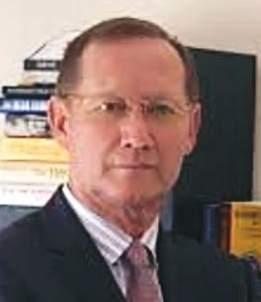
response to uncertainty. Leaders who succeed in driving transformation understand that effective communication is the key to reducing resistance. Clearly articulating the why behind the change fosters transparency and trust, making it easier for teams to align with the organisation’s vision. Ethiopian Airlines successfully executed its ambitious expansion by ensuring that all employees understood the strategic rationale behind the move, creating a sense of collective purpose.
Involving employees in the change process is another powerful way to minimise resistance. When individuals feel that they have a voice and their concerns are acknowledged, they are more likely to support and champion the transformation. South African Breweries has demonstrated this by engaging employees in sustainability projects, ensuring that new initiatives receive buy-in across all levels of the organisation.
Providing adequate support and training also plays a significant role in easing transitions. Employees often resist change when they feel unprepared to adapt. Investing in the necessary training helps teams develop the skills and confidence needed to navigate new realities. The Central Bank of Nigeria has recognised this by consistently providing leadership training
Whatever may be the excuses (and so many are being invented) it is only in a ‘ganusi’ economy that the government would be expending humongous amounts of money to import commodities that are available locally. Continued reliance on imports of petroleum products at a period in-country refining capacity can meet domestic need, especially in the age of Donald Trump, is what the Yoruba people would call ‘Akotileta’. It depicts someone who, lacking the wisdom to sustain inherited family treasures, decides to sell them off for a pittance that would then be frittered away. Meanwhile, the bottom-line in the hoopla of recent weeks, following President Trump’s tariff measures, is that every country is trying to protect their workers. Unfortunately, our economic managers fail to appreciate what is going on. After attending the THISDAY/ARISE anniversary ceremony in Lagos last week Monday, I decided to visit Dangote Refinery for the first time the next day. Having called Alhaji Aliko Dangote about my plan, he detailed Jeremiah Danladi Jiya, Group Head, Credit Risk who also heads his refinery site office, to give me a tour of their facilities. It’s like a city within a city as we spent several hours moving from one section to another. Statistical details about the refinery are mind-boggling. Altogether, the refinery has 177 tanks with a total capacity of 4.742 billion litres. For instance, it has storage capacity for nine million barrels of crude, over 600 million liters of Gasoline, 340 million litres of Diesel and Kerosine and 400 million litres of JET A1. The refinery pipeline infrastructure is also the largest anywhere in the world, with 1,100 kilometers to handle three billion standard cubic foot of gas per day. The refinery’s 435-megawatt power plant exceeds the total power

requirement of Ibadan Distribution Company (Disco). There are already research papers as to how the petrochemical processing steps have been able to exploit the adjacent Lekki Lagoon with “a sequential batch reactor and diverse filtration technologies” for treatment of a volume of water that can conveniently supply the whole of Victoria Island. Before the tour I had the opportunity to interact with Dangote regarding the refinery and the attitude of critical stakeholders in the sector. He shared several insights with me, including on the issue of
to equip teams with the competencies required to manage financial reforms effectively. Through TEXEM’s experiential methodology, leaders can learn how to turn resistance into enthusiasm, transforming barriers into opportunities for growth and innovation.
How can leaders balance empathy and assertiveness when managing change?
Great leadership is about striking the right balance between empathy and assertiveness. Leaders must listen with genuine empathy to understand their teams’ concerns, but they must also lead with clarity and decisiveness to ensure progress. Resistance to change is often rooted in fear—fear of uncertainty, fear of failure, and fear of the unknown. Addressing these fears directly through open dialogue fosters trust and makes transitions smoother. For example, Nigeria’s banking sector reforms were initially met with scepticism, but through proactive engagement with stakeholders, industry leaders were able to build trust and ensure compliance. Setting clear expectations while remaining supportive is equally important. Employees need reassurance, but they also need firm direction to navigate change successfully. When Kenya implemented mobile taxation policies, Safaricom took a proactive role in educating users while ensuring compliance, minimising resistance and ensuring a smooth transition. By mastering this delicate balance, leaders can cultivate a workplace where innovation thrives and employees remain engaged, even amid significant transformation. TEXEM’s leadership programme will provide actionable insights on how to refine this crucial skill.
How can organisations sustain agility through continuous improvement and innovation?
For organisations to remain agile, they must commit to continuous improvement and a culture of innovation. Encouraging open communication and idea-sharing creates an environment where diverse perspectives fuel creativity and drive forward-thinking solutions. Leaders must foster a culture where employees feel empowered to challenge the status quo and propose new ways of working. Investing in training and skill development ensures that teams are equipped to adapt to rapidly changing market conditions. When employees continue to learn and refine their abilities, they become more agile and proactive. Organisations that prioritise learning, like Dangote Group and Safaricom, consistently outperform competitors by staying ahead of industry trends. Recognising and rewarding creativity and calculated risk-taking further reinforces a culture of agility. Employees are more likely to experiment
pricing. “I have read some of the propaganda they are doing. Crude is internationally priced so it’s easy to understand the pricing template for petroleum products. But they also have a choice. It’s either they want Nigeria to be a productive economy that puts people to work, or they want to us to be a dumping ground” said Dangote who added that the forces against the refinery have the same mindset with those who killed the textile industry in Nigeria. “Our tanks are filled because the cartel of marketers and those who manage the sector have refused to patronize us. I am aware of their plan to cripple the refinery. But they should be prepared for a big fight.”
In my column, ‘Dangote’s Big Bet on Gasoline’ last July, I highlighted most of the contentious issues. But there should really be no need for a fight if the primary responsibility of critical stakeholders in the sector is to advance the public good. Even if there are differences, no responsible government should work towards the failure of a $20 billion project that adds considerable value to the economy. As they do in other countries, we must always encourage those who invest in production, and in the process create direct and indirect jobs for hundreds of thousands of our people. That is even more imperative in a nation like ours with a young population that is not productively engaged.
The sheer magnitude of the Dangote Refinery and the expected trickle-down effect in terms of employment opportunities, the forex that would be saved and general contributions to the economy cannot be downplayed. The same can be said of the small business owners who are daily being harassed by ARCON at a period we need to support them.
and propose bold ideas when they know their contributions are valued. Companies that celebrate innovation—whether through incentives, recognition programmes, or internal innovation labs—create a cycle of continuous improvement that strengthens long-term resilience.
Above all, leadership sets the tone for agility. If leaders do not innovate, neither will their teams. TEXEM’s leadership development programmes focus on equipping executives with the practical tools to embed innovation within their organisations and ensure lasting impact.
What is the role of leadership in sustaining agility?
Sustaining agility requires visionary leadership that not only anticipates market shifts but also takes proactive steps to innovate. Leaders must be forward-thinking, constantly scanning the external environment for opportunities and risks. The best leaders do not wait for disruption to happen—they shape the future by staying ahead of trends and positioning their organisations for long-term success. Encouraging decentralised decision-making is another essential aspect of sustaining agility. When decision-making is too centralised, organisations become slow and rigid. Empowering teams to take initiative ensures faster responses to emerging challenges and opportunities. Building strategic partnerships also strengthens long-term resilience. Organisations that collaborate with other businesses, government entities, and research institutions are better positioned to navigate complex challenges. Partnerships provide access to new technologies, market insights, and resources that can drive sustainable growth. TEXEM’s upcoming programme is designed to help leaders cultivate these essential leadership traits and ensure that their organisations remain agile in an increasingly volatile world.
Why should top leaders and executives attend the TEXEM programme?
TEXEM’s ‘Resilience in a Volatile World’ programme is an opportunity for leaders to gain actionable insights, learn from world-class faculty, and connect with influential decision-makers. The programme’s proven methodology ensures that learning is engaging, practical, and immediately applicable. Participants will benefit from real-world case studies tailored to African and global challenges, ensuring relevance and impact. Beyond knowledge acquisition, this programme provides an invaluable networking opportunity. Executives will have the chance to connect with C-suite leaders, industry experts, and policymakers, fostering relationships that can drive strategic partnerships and business growth.
While these businesses represent 96 per cent of entrepreneurship in the country and contribute 75 per cent of national employment, according to the Small and Medium Enterprises Development of Nigeria (SMEDAN), they face several challenges. In fact, doing any kind of business in Nigeria today is not for the fainthearted. You must provide your own utilities (electricity and water), pay all manner of charges to different agencies and at the end, what you get is harassment from government officials. Societies cannot grow meaningfully without translating individual energy, talent, and skills into assets that shape the future. That explains why countries that harness knowledge and skills to produce goods and services that attract top valuation continuously do better than those with scant regard for economic value creation. Nigerian government officials must therefore understand that putting people to productive use is the hallmark of creative and purposeful leadership and the fulcrum of social balance.
On 22nd October 1925, Mohandas Gandhi published in his weekly newspaper, ‘Young India’ what he described as ‘Seven Social Sins’. It is quite instructive that the first on the list of those ‘social sins’ he admonishes us to avoid is wealth without work, which in KWAM1Speak means a predisposition to ‘ganu si’. Sadly, that precisely is what government (at all levels) is encouraging in Nigeria by creating jobs that would “put food on the table” rather than help advance entrepreneurship that will take many citizens off the streets and add value to the economy. Yet even a fuji musician is smart enough to understand that a society cannot advance when you encourage ‘Ganu-Si’ ethos!

L-R:Chairman, Local Organising Committee / Chartered President,Inner wheel Club Nigeria, Omolara Adedugbe; Chairman, District 911, Inner wheel, Adenike Shodipo; National Representative/ President, Inner Wheel Nigeria, Karin Uwaje, and past International Inner Wheel President, Oluyemisi Alatise, during the media briefing on the forthcoming African Forum and Conference in Ikeja, Lagos…recently
Linus aleke in abuja
Operatives of the Federal Capital Territory (FCT), Police Command, yesterday apprehended and detained one Onu Simeon following a fatal altercation that led to the death of Ifeanyi Chukwu at Utako Market, Abuja.
A statement by Police Public Relations Officer, FCT Command, SP Josephine Adeh, said that
on February 5, 2025, at about 09:30a.m, the Command received a distress call regarding a fight in Utako Market.
She said the police operatives swiftly responded to the scene, where Ifeanyi Chukwu was found lying unconscious on the ground.
He was immediately rushed to NNPC Hospital, Utako, by police operatives, where a medical
‘Fintechs, Banks Must Collaborate for Nigeria’s Financial Future’
Folalumi alaran in abuja
A financial expert, Tolulope Sopelola, has urged deposit money banks (DMBs) and financial technology (fintech) firms in Nigeria to embrace collaboration rather than engage in unhealthy competition.
She emphasised that such synergy would enhance financial inclusion and improve the country’s financial services sector.
Speaking in an interview with our correspondent, Sopelola, who is an Associate member, Institute
of Chartered Accountants of Nigeria (ICAN) cited a 2022 report by Enhancing Financial Innovation & Access (EFInA), which revealed that fintech startups attracted over $1.3 billion in investments.
This significant funding, she noted, has strengthened fintech firms’ capacity to challenge traditional banks.
“The advent of financial technology has significantly transformed the global financial ecosystem, and Nigeria is no exception,” Sopelola said.
segun James
The Omniverse Africa Summit, Africa’s premier technology and innovation gathering, will take place from February 25-28, 2025 in Lagos, Charles Emembolu, the Co-Convener has disclosed. Organised in partnership with the GIZ/Digital Transformation Centre (DTC) Nigeria, and the Innovation Support Network (ISN), Emembolu said that the summit promises to be a transformative experience for thought leaders, investors, policymakers, and innovators from across Africa.
He said that the Digital Transformation Centre (DTC) Nigeria which is co-funded by the European Union (EU) and the German Federal Ministry for Economic Cooperation and Development (BMZ) is implemented by the Deutsche Gesellschaft für internationale Zusammenarbeit (GIZ).
According to him, the 2025 edition will welcome 20,000 attendees from over 20 countries, uniting key players from technology, finance, culture, government, and the private sector.
ibrahim Oyewale in Lokoja
The National Inland Waterways Authority (NIWA) has said it’s set to hold its Annual Management Retreat for better performance in 2025.
This was contained in statement signed by the Assistant General Manager, Corporate Affairs, Mr. Suleiman Makama, and made available to journalists in Lokoja yesterday.
Makama explained that the two-Day management retreat scheduled for February 7, is aimed at reviewing the authority’s 2024 performances
and chat a new course for 2025.
“The discussion at the retreat will be centred on Key Performance Indicator (KPI), review for 2024 and outlook for 2025.
“We shall also review our revenue performance for 2024 and targets for 2025, as well as organisational effectiveness, and communication,” he stated.
He noted that the retreat, which will be held at the NIWA Conference Hall, Lokoja, has the Minister of Marine and Blue Economy, Adegboyega Oyetola, as the Special Guest of Honour.
doctor confirmed him dead. Adeh said preliminary investigations revealed that Onu Simeon of Anguwan Biggy, Jabi Daki Biyu, and one Ifeanyi
Chukwu of Kuchigoro, Lugbe, had earlier engaged in a dispute over a space to display their goods for sale.
The disagreement, she
said escalated into a physical confrontation, during which Ifeanyi Chukwu suddenly collapsed and lost consciousness. She said that his remains have
since been deposited at a general hospital for further investigation, while the suspect, Onu Simeon, is currently in police custody as investigations continue.
Minister of the Federal Capital Territory (FCT), Nyesom Wike, yesterday led two former governors in the former G-5 Governors’ Forum, senators and a former Deputy Speaker of the House of Representatives to pay a condolence visit to the Governor of Oyo State, ‘Seyi Makinde.
Wike, who arrived Makinde’s Ikolaba residence in company with former governors of Abia and Benue states, Dr Okezie Ikpeazu and Samuel Ortom, commiserated with the governor, stating that “whatever affects him also affects the G-5 Governors.”
The delegation also included
Senators Philip Aduda, Mao Ohuabunwa, Olaka Nwogu, Sandy Onor and former Deputy Speaker of the House of Representatives, Rt. Hon. Chibudom Nwuche.
Similarly, a former Deputy National Chairman of the Peoples Democratic Party (PDP), Chief Olabode George; former Governor of Osun State, Prince Olagunsoye Oyinlola and a former Special Adviser on Political Matters to Governor Makinde and Member of the Oyo State Advisory Council, Hon. Babatunde Oduyoye, were at the Ikolaba home of the governor.
Laleye dipo in Minna
Twenty one children being trafficked from Magama town in the Magama Local Government Area of Niger State to Niger Republic have been rescued by security operatives.
The children were reportedly rescued in Gaidam town in Yobe State.
Linus aleke in abuja
Operatives of the Federal Capital Territory (FCT), Police Command, yesterday apprehended and detained one Onu Simeon following a fatal altercation that led to the death of Ifeanyi Chukwu at Utako Market, Abuja.
Addressing journalists in Minna yesterday, the state Deputy Governor, Yakubu Garba, praised the security agencies for rescuing the children-some of them not more than six years of age.
Garba said the agent behind the trafficking of the children had been arrested and in police custody, but declined to give his name.
The deputy governor explained that child trafficking is an unconstitutional act, adding that the action of the agent is designed to derail the policy of the state government to give education to all children
“We are in tandem with the federal government to stop child trafficking in the country,” Garba declared, adding that “the latest incident is one too many.” He declared: “Our government shall be very decisive in dealing with child traffickers,” adding that the security agencies should mount proper vigilance at the entry points into the state to arrest such incidence on the future.
A statement by Police Public Relations Officer, FCT Command, SP Josephine Adeh, said that on February 5, 2025, at about 09:30a.m, the Command received a distress call regarding a fight in Utako Market.
She said the police operatives swiftly responded to the scene, where Ifeanyi Chukwu was found lying unconscious on the ground.
He was immediately rushed to NNPC Hospital, Utako, by police operatives, where a medical doctor confirmed him dead.
Adeh said preliminary investigations revealed that Onu Simeon of Anguwan Biggy, Jabi Daki Biyu, and one Ifeanyi Chukwu of Kuchigoro, Lugbe, had earlier engaged in a dispute over a space to display their goods for sale. The disagreement, she said escalated into a physical confrontation, during which Ifeanyi Chukwu suddenly collapsed and lost consciousness.
sylvester idowu in Warri
A special investigative team set up by the Minister of Interior, Hon. Olubunmi Tunji-Ojo, arrived in Warri, Delta State, yesterday to look into allegation of involvement of inmates in armed robbery and kidnapping executed in Benin, Edo State, on January 3, this year.
The team is also expected to unravel the involvement of Okere Correctional Services officers in the release and return of the inmates, including a condemned convict, in the dastardly act.
Police operatives from Ekpan Division, near Warri in Delta State had arrested four serving inmates at Okere Correctional Service, popularly known as Okere prisons in Warri, for allegedly leaving the centre to commit armed robbery kidnapping in Edo State and thereafter returned to the facility. The operation, which was led by the Divisional Police Officer, CSP Aliyu Shaba, also led to the arrest of two correctional services officers that allegedly facilitated the movement of the suspects in and out of the facility for the robbery in Benin-city on January 3.
Emmanuel Ugwu-Nwogo in umuahia
Thousands of school teachers sacked from the Abia State basic and secondary school system by previous administration have joined the race for the 2,500 vacant positions in the classrooms.
The state Governor, Alex Otti, had during his media interaction last Thursday ruled out the possibility of recalling the sacked teachers, saying that he wasn’t the person that gave them the boot.
However, he stated that the
retrenched teachers were free to apply for fresh jobs in the ongoing recruitment of teachers to fill 2,500 teaching positions needed for now.
Apparently taking the cue from the governor, the sacked teachers have joined in sending an avalanche of applications that
have flooded the desk of the recruitment committee.
The state Commissioner for Information, Prince Okey Kanu, told journalists that no fewer than 17,000 teaching applications have so far been received and processed by the recruitment committee.
A stakeholder and Executive Director of IMPACT, Dr. Naomi Akpan-Ita, has called on the Department of Dispute and Conflict Resolution (DCR), an arm of the Niger Delta Development Commission (NDDC), to consider a transformational crisis management
approach in addressing crises within the Niger Delta communities.
Akpan-Ita made the call while featuring as the lead paper presenter during a 2024 retreat organised by DCR for its personnel in Lagos recently.
Akpan-Ita in her presentation
titled: “Crisis Management: Embracing Inclusivity for Effective Shift from Transactional to Transformational Approaches,” stated that to further enhance the work currently being done by the NDDC through the DCR in the Niger Delta, there should
be a conscious shift toward transformational approaches in addressing crises within the region. She said: “The transformational approach begins with the understanding that conflict has the potential to lead to positive change.”

Thursday, February 6, 2025
John Swinney to Donald Trump
Price: N400
“After months of collective punishment and the death of over 40,000 in Gaza, any suggestion Palestinians should be removed from their home is unacceptable and dangerous. There must be no ethnic cleansing. Only a proper two state solution will bring lasting peace”—Scotland’s First Minister, after the US president proposed taking ownership of the Gaza Strip and redeveloping it, with the Palestinians relocated to other countries within the region.


In a viral video said to have been recorded on the eighth-day Fidau prayers for the repose of his mother who died recently, Fuji musician, King Wasiu Ayinde Marshall (KWAM 1) could be heard lamenting to an unidentified man in the street slang common in Lagos, “Ilé bàbá mí ni FìdípQté, àwQn àlfà, wQn lQ bé; ibí ni gbogbo wQn wa se kínni? Ni wQn wa ga’nu sí.” A rough translation: ‘Rather than go to my father’s house in Fidipote, the clerics have shamelessly congregated in my house with their mouths wide open to scavenge.’ Stripped of all pretensions, the musician believed the clerics were more interested in the freebies they would get from him than performing their real function (in this case, offering prayers.)
It may have been unintended but there is a way in which the video—trending heavily among Yoruba people who consider ‘atenuje’ a serious malady—is a social commentary on the situation in Nigeria. Because, in so many ways, what officialdom now encourages in our country is ‘ganu si’ with the impediments they erect against entrepreneurship in favour of bubble jobs, at all levels of government. Just a few days after announcing the appointment of 130 special assistants on his X (formerly Twitter) handle, the Chairman of Obio-Akpor local government area of Rivers State, Chijioke Ihunwo, added another list of 100 special assistants, bringing the total to 230. They are to “help me achieve my plans for my people. Their appointment takes immediate effect,” he said in a post that attracted critical comments on how our economy has been reduced to wasting scarce resources. But Ihunwo is not alone in what has become a fad. Before him, a councillor, Yahaya Yusuf, representing Bajoga East local government of Gombe State, had appointed a principal private secretary (PPS), 12 special assistants and five personal assistants. The situation is worse in the states.
When in April 2020, then Governor Benjamin Ayade of Cross River State approved the appointment of 427 additional aides to join more than a thousand special assistants who were already on his payroll. He provided justification for the decision. “The governor has said repeatedly that he only needs about five per cent of his appointees” explained his spokesman, Christian Ita at the time. “So, he deliberately creates these jobs to put food on the table to reduce social tension.” Ayade, we must remember also explained how he was generating revenue through “the use of intellect to make up for naira and kobo” because, according to him, “Intellectual currency is stronger than paper currency and so where there is a deficiency of funds, the intellect takes over.”
Ordinarily, the primary role of government is to create an enabling environment and provide incentives for the private sector so that small, medium and large businesses can thrive. And in the process, generate employment opportunities

for the people. But what we have in Nigeria today are agencies of government manned by officials who believe their brief is to kill entrepreneurship, perhaps because job creation has been reduced to the appointment of idle special assistants for whom life begins and ends with merely “putting food on the table.” That is what happens when ‘Ganu si’ ethos defines government as is the case in Nigeria today.
For posting about her restaurant on Instagram “without the vetting and approval certificate of the Advertising Standards Panel”, a friend received a letter from the Advertising Regulatory Council of Nigeria (ARCON) asking her to “pay within 7 (seven) days of the receipt of this notice, the violation fee of N1,000,000 (one million Naira only) per violation/infraction in accordance with Article 148 (b)” of their law. She was then warned that any such ‘promotion’ must be submitted to some oga-at-the-top in ARCON before publishing. Why should ‘call this place to order food’ on social media require the vetting and approval of a government agency? And then wait for this: Same week, a third party she doesn’t have any relationship with posted about the eatery on Tik Tok and she received another one million Naira fine from ARCON! That can only happen in a ‘Ganu si’ economy where officials behave like scavengers. I understand that ARCON has a 2022 Act which allows it to classify any published item as promotional, requiring prior approval. The law even grants ARCON the power to establish a kangaroo tribunal for the purpose of sending culprits to jail in a manner that is no different from what the fictional Chief Eleyinmi of Oja in
There is a way in which the KWAM1 video—trending heavily among Yoruba people who consider ‘atenuje’ a serious malady—is a social commentary on the situation in Nigeria. Because, in so many ways, what officialdom now encourages in our country is ‘ganu si’ with the impediments they erect against entrepreneurship in favour of bubble jobs.
the popular ‘Village Headmaster’ sitcom of old used to do with his famous refrain, “Just bring him to my court.” This law makes ARCON the complainant, prosecutor and judge in this so-called tribunal. Besides, since “deemed promotion” is for ARCON to decide, anything can be classified as promotional. So, if I write a column in THISDAY on ‘Amala Place’ in Abuja where I enjoy the delicacies, I must first take it to some fat cats at ARCON for editing before publication otherwise the food sellers would be deemed to have committed an offence! This is a ridiculous and dangerous law that limits enterprise. Some of the sweeping provisions are even in conflict with the 1999 constitution. To compound the problem, the law also says you cannot even sue ARCON unless you send them a letter first on pre-action suit!
With such omnibus powers, it is no surprise that ARCON has shifted its attention to influencers, bloggers, comedians, skit makers, agencies and brand owners who publish or broadcast anything promotional not submitted for the agency’s approval. “What we are saying is that there is a line and space called advertising. If you cross that line and move your skit or comedy into the advertising space as defined by law, then you are moving into a regulated space, and your activities in that space will be regulated,” ARCON Director General, Olalekan Fadolapo warned recently. But there is also a pushback. “If you look at this new law that we are trying to fight, it covers everything, including logos, trademarks and all. What the court said in the NBC (National Broadcasting Commission)
case is that you cannot be jury and executioner, that you cannot be regulator and executioner at once,” the Advertisers Association of Nigeria (ADVAN) president, Osamede Uwubanmwen, said in response to ARCON activities. “But you won’t expect ARCON to learn from the NBC. They will not do that. The NBC now will be very cautious about fining anybody, because they have lost the first case and have lost the appeal. I don’t know if they will go to the Supreme Court.” I am aware that we have numerous useless laws passed by the National Assembly but my main concern about ARCON is the danger their officials pose to our economy. Though the agency is not alone in that respect. At a period when we need to address the unemployment crisis, the main obsession of government is revenue generation. Nobody cares that by putting in place measures that discourage job creation we are invariably promoting ‘ganu si’ citizenry and no nation develops with such disposition. Meanwhile, it is not only small-scale businesses that suffer from this myopic thinking—even big businesses that employ thousands of workers no longer enjoy any protection as we can see from the example of Dangote Refinery.
Between October 2024 and end of January 2025, according to reports at the weekend, the Nigeria National Petroleum Company Limited (NNPCL) and a number of oil marketers spent over N5.5 trillion to import petrol and diesel...
One of the tragedies of public service in Nigeria is that many of the operatives do not have a second address or another daytime job beyond politics. That perhaps explains why elections are for most of them a do-or-die affair. But there are also professionals for whom being in government is a tour of duty, essentially to serve the public good. And once their assignment is done, they go back to their primary vocation. One such person is the former Governor of Ekiti State, Kayode Fayemi who will, today in Abuja, launch his ‘Amandla Policy and Leadership Initiative’ and latest book, ‘If This Giant Must Rise’—a collection of recent interventions on leadership and governance in Africa.
Spanning 216 pages and divided into nine chapters, the book is a collection of papers and lectures written and delivered since Fayemi left the governor’s office in October 2022. While the issues discussed are national and international, the book is arranged in thematic order rather than by the period of their first presentations. “Together, they tell a story that tries to see through and beyond what is immediately in front of us,” Fayemi wrote in the preface to the book he says, “offers both a reflection on my time in office as well as a glimpse of what to expect from me in the years ahead.”
The long foreword by Wale Adebanwi, Presidential Penn Compact Professor of African Studies, University of Pennsylvania, United States, sets the tone for the book. “For the publicly engaged scholar or public intellectual, engagement with power is not only a necessity; it is an ethical obligation,” Adebanwi wrote while arguing on why people like Fayemi are needed in government. “Even direct entry into partisan politics against
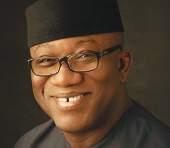
the backdrop of this ethical obligation makes politics a vocation and not a vacation for the scholar.”
Borrowing from his varied experiences and exposure as a public intellectual who had opportunities to serve in both his state as governor and at the federal level as a minister, Fayemi’s fascinating collection reminds us of the challenges of building a society that works for the people and how each of us has a role to play in that regard. “As the continent grapples with the vicissitudes of the changing dynamics, it is imperative that we build the capacity and develop the policy tools that will turn Africa’s potential to prosperity,” Fayemi wrote while explaining the rationale for establishing the Amandla Policy Institute being launched today. “That is the task before us, and it is one that I’m determined to contribute to.”